Refuge Teen
This is a repository of studies that were posted weekly before we started doing small groups.
Titus 2:1-8 (The Message)
Your job is to speak out on the things that make for solid doctrine. Guide older men into lives of temperance, dignity, and wisdom, into healthy faith, love, and endurance. Guide older women into lives of reverence so they end up as neither gossips nor drunks, but models of goodness. By looking at them, the younger women will know how to love their husbands and children, be virtuous and pure, keep a good house, be good wives. We don't want anyone looking down on God's Message because of their behavior. Also, guide the young men to live disciplined lives.
But mostly, show them all this by doing it yourself, incorruptible in your teaching, your words solid and sane. Then anyone who is dead set against us, when he finds nothing weird or misguided, might eventually come around.

HOW YOU ACT INFLUENCES OTHER PEOPLE!!!!!! I can't stress this enough. How you act will portray the Gospel in positive or negative ways. When you act like a jerk or have profane exclamations you set yourself up for "There's no difference between how 'he/she' acts and the way I act, and they're a Christian! So what do I have to worry about?"
Likewise, when you act in a godly manner you give people no reason to slander you or the Gospel you proclaim. It's like in college, I had a handful of girlfriends my Sophomore year. Half of them were only interested in sex or some sort of physical relationship, but when I did not capitulate to their desires I was dumped. When asked why they broke up with me, the only answer they could give was, "He said he wouldn't do 'this' or 'that'."

What kind of message does that send? A very GOOD one!! When we live incorruptible lives then we cannot be shown to be bad examples. It gives us a chance to show people what Christ can do in our lives. BUT WHEN WE LIE or when we SLANDER OTHER PEOPLE we lose that ground. You are not your own.

Paul tells us in 1 Corinthians, "You are not your own, you were bought with a price." Act like the one who paid the price for you, treat others as Christ would treat them. Live your life as Christ lived his and, as Paul says in First Timothy, "Watch your life and doctrine closely. Persevere in them, because if you do, you will save both yourself and your hearers."
Ecclesiastes 7:13-14 (NIV)
Consider what God has done:
Who can straighten
what he has made crooked?
When times are good, be happy;
but when times are bad, consider:
God has made the one
as well as the other.
Therefore, a man cannot discover
anything about his future…

God has made everything. It is His. You, me, that guy over there, yo momma, this tree, those fishies…everything. It's His. He made both the good times and the bad. Sometimes we want to think that because we follow Christ and strive to be what God created us to be, that our life will be all flowers and butterflies.
Who are we to be angry with what He has given us? Sure we question, we do. We wonder why things turned out the way they did. We wonder what life would have been like if things had gone differently. But its not our place to sit in judgment of God and what He has done or what He will do.

Let me ask a simple question. What good does it do to question what could have been? You can wish you'd been born at another time, or to different parents. You can think about what it would have been like if he or she hadn't left. You can ponder what life would have been if you'd had tons more money. But let me ask another question. What good does it do?

Truthfully, we have each been given a place. Whether we are content with the circumstances is irrelevant. Sure you can improve some of those circumstances, but fretting about it and doing something about it will mean the difference between success and failure. There are some thing, that no matter how hard you try, you can never change. Learn to be at peace. In Philippians Paul tells us, "Do not be anxious [worry] about anything, but in everything, by prayer and petition, with thanksgiving, present your requests to God. And the peace of God, which transcends all understanding, will guard your hearts and your minds in Christ Jesus.
1 Kings 21:1-16 (The Message)
And then, to top it off, came this: Naboth the Jezreelite owned a vineyard in Jezreel that bordered the palace of Ahab king of Samaria. One day Ahab spoke to Naboth, saying, "Give me your vineyard so I can use it as a kitchen garden; it's right next to my house-so convenient. In exchange I'll give you a far better vineyard, or if you'd prefer I'll pay you money for it."
But Naboth told Ahab, "Not on your life! So help me GOD, I'd never sell the family farm to you!" Ahab went home in a black mood, sulking over Naboth the Jezreelite's words, "I'll never turn over my family inheritance to you." He went to bed, stuffed his face in his pillow, and refused to eat.
Jezebel his wife came to him. She said, "What's going on? Why are you so out of sorts and refusing to eat?"
He told her, "Because I spoke to Naboth the Jezreelite. I said, 'Give me your vineyard-I'll pay you for it or, if you'd rather, I'll give you another vineyard in exchange.' And he said, 'I'll never give you my vineyard.'"
Jezebel said, "Is this any way for a king of Israel to act? Aren't you the boss? On your feet! Eat! Cheer up! I'll take care of this; I'll get the vineyard of this Naboth the Jezreelite for you."
She wrote letters over Ahab's signature, stamped them with his official seal, and sent them to the elders in Naboth's city and to the civic leaders. She wrote "Call for a fast day and put Naboth at the head table. Then seat a couple of stool pigeons across from him who, in front of everybody will say, 'You! You blasphemed God and the king!' Then they'll throw him out and stone him to death."
And they did it. The men of the city-the elders and civic leaders- followed Jezebel's instructions that she wrote in the letters sent to them. They called for a fast day and seated Naboth at the head table. Then they brought in two stool pigeons and seated them opposite Naboth. In front of everybody the two degenerates accused him, "He blasphemed God and the king!" The company threw him out in the street, stoned him mercilessly, and he died.
When Jezebel got word that Naboth had been stoned to death, she told Ahab, "Go for it, Ahab-take the vineyard of Naboth the Jezreelite for your own, the vineyard he refused to sell you. Naboth is no more; Naboth is dead."
The minute Ahab heard that Naboth was dead, he set out for the vineyard of Naboth the Jezreelite and claimed it for his own.

Alright, this guy was the KING!! THE KING!! He had everything he possibly needed and probably almost everything he wanted. Rich beyond the means of any other Israelite he was still a petulant and greedy brat. When this rich man is told "no" he throws a tempter tantrum! He sulks in his room with his faced buried in the pillow. What a whiny little pansy.

But this is what greed does to us. No matter what we have, its never good enough. Ahab had access to many vineyards, but he wanted Naboth's. He probably came to find out that he wanted it even more when he was told he couldn't have it. That's the funny thing about greed, it's the carrot we can't catch. Even if we had everything that we want, we would find new things to want. Go ahead, ask someone who has a lot of something.

I love my mother, but she is nuts about fabric, maybe some of you can relate. I doesn't matter how many different kinds she has, there's always something else she "needs". She has shelves and shelves of fabric she will never use. I have personally burned many many many many more shelves worth because it wasn't good enough. Some of it ended up as animal bedding. I imagine she has gone through tens of thousands of yards of fabric , but there's always something new.
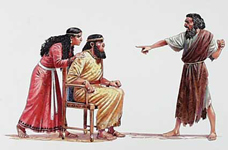
Ahab was one of the most wicked kings Israel ever had. As you can see his wife was no saint either. The name "Jezebel" has come to be used as a VERY derogatory term for an evil woman. These two earned their reputation by a lot of hard work and injustice. Its hard to become the MOST wicked, you got a lot of people you have got to beat for that title (figuratively and literally). We need to learn to be content with what we have so that we don't unknowingly or unintentionally injure others because of our desires.
Psalm 57 (The Message)
Be good to me, God - and now! I've run to you for dear life.
I'm hiding out under your wings
until the hurricane blows over.
I call out to High God,
the God who holds me together.
He sends orders from heaven and saves me,
he humiliates those who kick me around.
God delivers generous love,
he makes good on his word.
I find myself in a pride of lions
who are wild for a taste of human flesh;
Their teeth are lances and arrows,
their tongues are sharp daggers.
Soar high in the skies, O God!
Cover the whole earth with your glory!
They booby-trapped my path;
I thought I was dead and done for.
They dug a mantrap to catch me,
and fell in headlong themselves.
I'm ready, God, so ready,
ready from head to toe,
Ready to sing, ready to raise a tune:
"Wake up, soul!
Wake up, harp! wake up, lute!
Wake up, you sleepyhead sun!"
I'm thanking you, GOD, out loud in the streets,
singing your praises in town and country.
The deeper your love, the higher it goes;
every cloud is a flag to your faithfulness.
Soar high in the skies, O God!
Cover the whole earth with your glory!

David wrote this song while he was hiding in a cave, hiding from a king who wanted to kill him. I don't have a real poignant thought this week. Sometimes we just need to read that God does come to our rescue. I needed to read this so I thought you might find hope in it as well.
Matthew 27:27-31 (Message)
The soldiers assigned to the governor took Jesus into the governor's palace and got the entire brigade together for some fun. They stripped him and dressed him in a red toga. They plaited a crown from branches of a thorn bush and set it on his head. They put a stick in his right hand for a scepter. Then they knelt before him in mocking reverence: "Bravo, King of the Jews!" they said. "Bravo!" Then they spit on him and hit him on the head with the stick. When they had had their fun, they took off the toga and put his own clothes back on him. Then they proceeded out to the crucifixion.

I remember when "The Passion of the Christ" came out. I remember sitting in my seat with tears streaming down my face, knowing that the pain Jesus suffered was for me and because of me. I remember being glued to my seat while Jesus was mocked. As if it wasn't enough that they were going to kill him in one of the most cruel forms of execution known to the Roman Empire, they felt the need to mock and belittle Him first.

I remember the thought that despite the insult added to injury, Jesus still endured. Then it brought to mind something He said before being arrested, "Remember the words I spoke to you: 'No servant is greater than his master.' If they persecuted me, they will persecute you also." This is not something to just gloss over. We see it day in and day out, people mocking Christ and Christianity without reverence. Whenever someone tries to mock Islam there's a huge backlash, the same for many other groups.

Yet we think we can do something to avoid being mocked once we show people evidence of our faith. Let me tell you, we can't escape it. Paul tells Timothy, "…everyone who wants to live a godly life in Christ Jesus will be persecuted…" This is something to keep in mind, when you stand up for your faith people are going to try to knock you down. Be ready for it, expect it, but never let it deter you from your purpose to glorify the Lord of Heaven and Earth with your life.
Paul also recites this saying from the early Christian church:
If we died with him,
we will also live with him;
If we endure,
we will also reign with him.
If we disown him,
he will also disown us;
If we are faithless,
he will remain faithful,
for he cannot disown himself.
Acts 9:1-6 (NLT)
Meanwhile, Saul was uttering threats with every breath and was eager to kill the Lord's followers. So he went to the high priest. He requested letters addressed to the synagogues in Damascus, asking for their cooperation in the arrest of any followers of the Way he found there. He wanted to bring them - both men and women - back to Jerusalem in chains.
As he was approaching Damascus on this mission, a light from heaven suddenly shone down around him. He fell to the ground and heard a voice saying to him, "Saul! Saul! Why are you persecuting me?"
"Who are you, lord?" Saul asked.
And the voice replied, "I am Jesus, the one you are persecuting! Now get up and go into the city, and you will be told what you must do."

I remember reading once, a dialogue between a pastor and a cynic. The cynic asked the pastor if he really thought "such and such" could change his life. The pastor replied with interminable wisdom, "I'm in the business of changed lives. If a man cannot change his life then my life is utterly worthless."

We as Christians are in the business of changed lives, the lives of ourselves as well as the lives of others. If our faith is worth anything then it must change us. It must cause us to turn from our former selves and run into to the arms of Jesus Christ. Saul, who is later known as Paul, has a radical change on the road to Damascus. He goes from being someone bent on the destruction of the followers of Christ to being one of their foremost advocates.
Paul even lets us know that people who are washed in the blood of Christ are changed creatures. In 1 Corinthians he gives us a list of those who will not inherit the Kingdom of Heaven: "Neither the sexually immoral nor idolaters nor adulterers nor male prostitutes nor homosexual offenders nor thieves nor the greedy nor drunkards nor slanderers nor swindlers will inherit the kingdom of God." But he quickly follows this statement up with, "And that is what some of you were."

We have grace, we have a changed life, act like it! Before we were washed in the blood of our Savior we were outside of grace, but now we find ourselves changed. Bring that change to others, even those you fear have no chance. Paul called himself the "worst of all sinners" because of his persecution of the church. If the worst of all sinners can become such as he became, what possibilities we have.
2 Corinthians 12:8-10 (NIV)
Three times I pleaded with the Lord to take {the thorn of torment} away from me. But he said to me, "My grace is sufficient for you, for my power is made perfect in weakness." Therefore I will boast all the more gladly about my weaknesses, so that Christ's power may rest on me. That is why, for Christ's sake, I delight in weaknesses, in insults, in hardships, in persecutions, in difficulties. For when I am weak, then I am strong.

Have you ever thought about weakness? We are often encouraged to be strong. Weakness is seen as a failing. We want to be seen as strong, self-sufficient, successful. Where we run into problems is when we begin to realize that God works in us through our fault and failings. Sure He uses our strengths but more often than not He uses our weakness.
Think back if you will:
Gideon - God whittled his army from tens of thousands to hundreds so that everyone would know it was God's victory.
Jonathon - Attacks a Philistine outpost with only his armor bearer and sends the entire army into panic.
Zacchaeus - Through his weakness for money God was glorified. When he changed God was given glory.
Jesus - Through his death set us free of the penalty of sin.

Have you ever played with a Chinese finger puzzle? It's a tricky little bugger. You stick two fingers in it and pull. It traps your fingers as it pulls tighter. The harder you pull the tighter it grips and the less likely it is to let go of your fingers. It's only when you allow for the possibility that your strength will not win your freedom that you can be free.
It's the same with our spiritual lives. Until we stop trying to do things by our power and open ourselves up the Lord we will find frustration. An experience with the living God will change us. It's inevitable. A prominent church theologian in the 13th century Thomas Aquinas after having written MANY books on God, Jesus, and theology had an mystical experience of the Living God. He stopped writing and when asked why he said that, "All that I have written appears to be as much straw after the things that have been revealed to me."
God uses us where we think we are useless. Never doubt that He can work in you.

Proverbs 30:7-9 (NIV)
"Two things I ask of you, O LORD;
do not refuse me before I die:
Keep falsehood and lies far from me;
give me neither poverty nor riches,
but give me only my daily bread.
Otherwise, I may have too much and disown you
and say, 'Who is the LORD ?'
Or I may become poor and steal,
and so dishonor the name of my God. "

I am continually fascinated with this passage. I find it fascinating because, not only is the writer asking to avoid BOTH excess and want, but the reasons he gives for his request. His desire is based on the how either extreme would affect his relationship with Almighty God.

He's not asking for his own happiness, but he is asking that his circumstances be such that he does not dishonor God with either his neglect or his actions. I think he taps into a fundamental issue that we all deal with. There is a fine balance between need and want. There is a fine balance between rich and poor.

We have everyday physical needs, that's the reality of life. God understands that. In Genesis 3:21 after Adam and Eve have sinned God makes them clothes. It specifically says, "God made garments of skin for Adam and his wife and clothed them." Not only did he make clothes for people who just sinned, you could arguably say God put the clothes on them. Jesus re-iterates this in the gospels. He tells us to look at the beauty of the flowers and to know that God cares for us more than they.
We walk a perilous line between what we need to physically survive and things that feed our greed. It's easy to swing to one extreme or the other. I would encourage you to carefully consider the consequences of such action.
Ecclesiastes 5:10-17 (NLT)
Those who love money will never have enough. How meaningless to think that wealth brings true happiness! The more you have, the more people come to help you spend it. So what good is wealth - except perhaps to watch it slip through your fingers!
People who work hard sleep well, whether they eat little or much. But the rich seldom get a good night's sleep.
There is another serious problem I have seen under the sun. Hoarding riches harms the saver. Money is put into risky investments that turn sour, and everything is lost. In the end, there is nothing left to pass on to one's children. We all come to the end of our lives as naked and empty-handed as on the day we were born. We can't take our riches with us.
And this, too, is a very serious problem. People leave this world no better off than when they came. All their hard work is for nothing - like working for the wind. Throughout their lives, they live under a cloud - frustrated, discouraged, and angry.

I know I talk about money a lot, but I really feel that it's a problem that modern Christians struggle with intensely. We hear a prosperity gospel all too often. We hear that God doesn't care about the decisions we make with our money. Nothing could be farther from the truth. God cares how you spend your money. He cares what kind of car you buy. He cares how much you give to those bell ringers during the Christmas season. He cares whether you are wasting your money on things that cannot satisfy.
Jesus tells us in Luke that we should use our wealth to influence people to gain friends so that so that we (and they) will be welcomed into eternal dwellings. We are not given wealth because we "deserve" it. God dispenses wealth, not for our personal pleasure, but for us to use for His Kingdom. Early Christians used any excess they had financially to help those who were struggling or to support the ministry of the apostles.

We are given a couple of stories in the New Testament that Jesus says outright that those who have been proven to be faithful with little will be given much. But those who are irresponsible with little will have even that taken away from them. Money is not something we can take with us when we pass on. It is meant to be used, but used in such a way that God will be proud of how we handle it.

This week I'm going to make the Scripture and Study interactive. If this goes well, I might even try the Challenge again. I'm going to give all three types of Bible translations again and I would like you to tell me which one you like best and why you like it. If you need to know what kind of translation each is you can look back at the last 3 lessons and figure it out. It's all spelled out there.
NIV
1 Who has believed our message
and to whom has the arm of the LORD been revealed?
2 He grew up before him like a tender shoot,
and like a root out of dry ground.
He had no beauty or majesty to attract us to him,
nothing in his appearance that we should desire him.
3 He was despised and rejected by men,
a man of sorrows, and familiar with suffering.
Like one from whom men hide their faces
he was despised, and we esteemed him not.
4 Surely he took up our infirmities
and carried our sorrows,
yet we considered him stricken by God,
mitten by him, and afflicted.
5 But he was pierced for our transgressions,
he was crushed for our iniquities;
the punishment that brought us peace was upon him,
and by his wounds we are healed.
6 We all, like sheep, have gone astray,
each of us has turned to his own way;
and the LORD has laid on him
the iniquity of us all.
ESV
1 Who has believed what he has heard from us?
And to whom has the arm of the LORD been revealed?
2For he grew up before him like a young plant,
and like a root out of dry ground;
he had no form or majesty that we should look at him,
and no beauty that we should desire him.
3 He was despised and rejected by men;
a man of sorrows, and acquainted with grief;
and as one from whom men hide their faces
he was despised, and we esteemed him not.
4 Surely he has borne our griefs
and carried our sorrows;
yet we esteemed him stricken,
smitten by God, and afflicted.
5 But he was wounded for our transgressions;
he was crushed for our iniquities;
upon him was the chastisement that brought us peace,
and with his stripes we are healed.
6 All we like sheep have gone astray;
we have turned—every one—to his own way;
and the LORD has laid on him
the iniquity of us all.

The Message
1 Who believes what we've heard and seen? Who would have thought God's saving power would look like this?
2-6The servant grew up before God—a scrawny seedling,
a scrubby plant in a parched field.
There was nothing attractive about him,
nothing to cause us to take a second look.
He was looked down on and passed over,
a man who suffered, who knew pain firsthand.
One look at him and people turned away.
We looked down on him, thought he was scum.
But the fact is, it was our pains he carried—
our disfigurements, all the things wrong with us.
We thought he brought it on himself,
that God was punishing him for his own failures.
But it was our sins that did that to him,
that ripped and tore and crushed him—our sins!
He took the punishment, and that made us whole.
Through his bruises we get healed.
We're all like sheep who've wandered off and gotten lost.
We've all done our own thing, gone our own way.
And God has piled all our sins, everything we've done wrong,
on him, on him.

Our final segment regarding Bible translations is going to focus on what are called dynamic equivalence. These are translations that try to stay close to the literal translation but make slight exceptions in order to improve readability and understanding. This is the middle ground translation between a paraphrase and a literal translation. The Bible you'll find in the pew at church is a New International Version (NIV). The NIV was fully translated in 1978 from early Greek texts. It was a project undertaken because there were many in the Evangelical community who felt the Revised Standard Version was not a truly accurate translation, but they wanted something that was readable in modern English.

I'm going to give you all three different kinds of translations for comparison. I'll use the three most popular versions, which I will label, so that you can see all the differences.
NIV Philippians 4:4-9
4Rejoice in the Lord always. I will say it again: Rejoice! 5Let your gentleness be evident to all. The Lord is near. 6Do not be anxious about anything, but in everything, by prayer and petition, with thanksgiving, present your requests to God. 7And the peace of God, which transcends all understanding, will guard your hearts and your minds in Christ Jesus.
8Finally, brothers, whatever is true, whatever is noble, whatever is right, whatever is pure, whatever is lovely, whatever is admirable - if anything is excellent or praiseworthy - think about such things. 9Whatever you have learned or received or heard from me, or seen in me - put it into practice. And the God of peace will be with you.
ESV Philippians 4:4-9
4 Rejoice in the Lord always; again I will say, Rejoice. 5Let your reasonableness be known to everyone. The Lord is at hand; 6 do not be anxious about anything, but in everything by prayer and supplication with thanksgiving let your requests be made known to God. 7And the peace of God, which surpasses all understanding, will guard your hearts and your minds in Christ Jesus.
8Finally, brothers, whatever is true, whatever is honorable, whatever is just, whatever is pure, whatever is lovely, whatever is commendable, if there is any excellence, if there is anything worthy of praise, think about these things. 9What you have learned and received and heard and seen in me - practice these things, and the God of peace will be with you.
The Message Philippians 4:4-9
4-5Celebrate God all day, every day. I mean, revel in him! Make it as clear as you can to all you meet that you're on their side, working with them and not against them. Help them see that the Master is about to arrive. He could show up any minute!
6-7Don't fret or worry. Instead of worrying, pray. Let petitions and praises shape your worries into prayers, letting God know your concerns. Before you know it, a sense of God's wholeness, everything coming together for good, will come and settle you down. It's wonderful what happens when Christ displaces worry at the center of your life.
8-9Summing it all up, friends, I'd say you'll do best by filling your minds and meditating on things true, noble, reputable, authentic, compelling, gracious - the best, not the worst; the beautiful, not the ugly; things to praise, not things to curse. Put into practice what you learned from me, what you heard and saw and realized. Do that, and God, who makes everything work together, will work you into his most excellent harmonies.

Continuing with our investigation into why there are so many different Bible translations, we come to a style called "formal equivalence". This is also known as a "literal" translation. With a "paraphrase" the translator is trying to capture the idea in the text but not the actual words. With a "literal" translation the translator is more interested in trying to get each word to match as best as possible. When translating from one language to another you have many hurdles to overcome. Some cultures have many words for one concept, but when you translate that to another language you run into a problem if the new language doesn't have an identical equivalent.

For example: In the koine greek, which is what most of the New Testament was written in, there are 5 different words for "love". Each described a different kind of love. In English we only have the word "love". We can use other words to try to describe the greek versions, but then it is no longer an "exact" translation.
We will be using the NIV as our base text again this week.
NIV - John 3:11-15
11I tell you the truth, we speak of what we know, and we testify to what we have seen, but still you people do not accept our testimony. 12I have spoken to you of earthly things and you do not believe; how then will you believe if I speak of heavenly things? 13No one has ever gone into heaven except the one who came from heaven-the Son of Man.14Just as Moses lifted up the snake in the desert, so the Son of Man must be lifted up, 15that everyone who believes in him may have eternal life.
English Standard Version - John 3:11-15
11Truly, truly, I say to you, we speak of what we know, and bear witness to what we have seen, but you do not receive our testimony. 12If I have told you earthly things and you do not believe, how can you believe if I tell you heavenly things? 13 No one has ascended into heaven except he who descended from heaven, the Son of Man. 14And as Moses lifted up the serpent in the wilderness, so must the Son of Man be lifted up, 15that whoever believes in him may have eternal life.
New American Standard - John 3:11-15
11"Truly, truly, I say to you, we speak of what we know and testify of what we have seen, and you do not accept our testimony.
12"If I told you earthly things and you do not believe, how will you believe if I tell you heavenly things?
13"No one has ascended into heaven, but He who descended from heaven: the Son of Man.
14"As Moses lifted up the serpent in the wilderness, even so must the Son of Man be lifted up;
15so that whoever believes will in Him have eternal life.
And some consider the King James to be literal, so we'll add that to.
KJV - John 3:11-15
11Verily, verily, I say unto thee, We speak that we do know, and testify that we have seen; and ye receive not our witness.
12If I have told you earthly things, and ye believe not, how shall ye believe, if I tell you of heavenly things?
13And no man hath ascended up to heaven, but he that came down from heaven, even the Son of man which is in heaven.
14And as Moses lifted up the serpent in the wilderness, even so must the Son of man be lifted up:
15That whosoever believeth in him should not perish, but have eternal life.

This week I'm going to try something a little different. I'm going to choose a passage of scripture and give you a handful of different Bible translations that emphasize different foci of the text. For the rest of December I'll be making an effort to help you understand the differences between Bible translations.

We will start out with what are called "Paraphrase Bibles". These Bibles seek to capture the meaning of the text and to try to communicate that meaning to people in modern language. They try to use what the text is trying to say instead of relying on the words actually used. This kind of Bible is very good if you are trying to grasp concepts, but can be "colored" by the translator because of the additional interpretation it takes to put it into common language. We will look at Psalms 73:25-28 using the NIV as our standard Bible (which is what is in the church pews) and then look at how several "Paraphrases" treat the text.
NIV
25 Whom have I in heaven but you?
And earth has nothing I desire besides you.
26 My flesh and my heart may fail,
but God is the strength of my heart
and my portion forever.
27 Those who are far from you will perish;
you destroy all who are unfaithful to you.
28 But as for me, it is good to be near God.
I have made the Sovereign LORD my refuge;
I will tell of all your deeds.
The Message
25-28 You're all I want in heaven!
You're all I want on earth!
When my skin sags and my bones get brittle,
GOD is rock-firm and faithful.
Look! Those who left you are falling apart!
Deserters, they'll never be heard from again.
But I'm in the very presence of GOD-
oh, how refreshing it is!
I've made Lord GOD my home.
GOD, I'm telling the world what you do!
Good News Bible
25What else do I have in heaven but you?
Since I have you, what else could I want on earth?
26My mind and my body may grow weak,
but God is my strength;
he is all I ever need.
27Those who abandon you will certainly perish;
you will destroy those who are unfaithful to you.
28But as for me, how wonderful to be near God,
to find protection with the Sovereign LORD
and to proclaim all that he has done!
New Living Translation
25 Whom have I in heaven but you?
I desire you more than anything on earth.
26 My health may fail, and my spirit may grow weak,
but God remains the strength of my heart;
he is mine forever.
27 Those who desert him will perish,
for you destroy those who abandon you.
28 But as for me, how good it is to be near God!
I have made the Sovereign LORD my shelter,
and I will tell everyone about the wonderful things you do.
Psalm 123 (CEV)
Our LORD and our God,
I turn my eyes to you,
on your throne in heaven.
Servants look to their master,
but we will look to you,
until you have mercy on us.
Please have mercy, LORD!
We have been insulted
more than we can stand,
and we can't take more abuse
from those proud,
conceited people.

How many times have you found yourself here? Waiting and begging God to have mercy on you. To take away the undeserved oppression heaped down on you from those who are only concerned for themselves. Have you been insulted to the point that you can stand it no longer? Sometimes we can feel like one more straw will break our back. It's a normal feeling. We all have times when we feel utterly abandoned.
But there is good news! You have not been forsaken! God does have mercy, He will bestow on you the joy of His glory. I know it can be hard to look out from under the burdens on your back and have hope, but hope is imperative for our lives.
Please, trust me on this. God can and will work through your life even though it seems that you are sorely pressed on each side. I wish I could say something other than He is watching over you and He will use this for good. I know we would rather have a set answer. "Alright, the suffering will end Monday at 2:10pm. You will grow in patience endurance and you will meet that person who will hold you up through the next trial."

It would be nice if God gave us detailed notes like that, but He doesn't. You need to hope, pray and put your trust in Him. Paul tells us this in Romans, "And we know that in all things God works for the good of those who love him, who have been called according to his purpose." Hope in Jesus.
Philippians 3:4-9 (NIV)
If anyone else thinks he has reasons to put confidence in the flesh, I have more: circumcised on the eighth day, of the people of Israel, of the tribe of Benjamin, a Hebrew of Hebrews; in regard to the law, a Pharisee; as for zeal, persecuting the church; as for legalistic righteousness, faultless.
But whatever was to my profit I now consider loss for the sake of Christ. What is more, I consider everything a loss compared to the surpassing greatness of knowing Christ Jesus my Lord, for whose sake I have lost all things. I consider them rubbish, that I may gain Christ and be found in him, not having a righteousness of my own that comes from the law, but that which is through faith in ChristÑthe righteousness that comes from God and is by faith.

Often we can have this mistaken notion that we are secure in our faith because of something we have done of our own volition. I go to church, therefore I'm a Christian. My parents are Christians, therefore I am a Christian. I know lots of Bible verses and am theologically wise, therefore I am a follower of Christ. I don't break any laws and am basically a good person, therefore I am safe from the judgment of God.

Paul says no. He first puts forth his physical and religious qualifications for why he could be considered holy. He then denounces them, all of those earthly qualifications. Our own righteousness does not save us. Only by our faith in Jesus and our striving to become like Him will we ever have even a measure of true righteousness. Nothing we do to our body either saves us or can separate us from Christ. No action we take will make us more righteous in front of God. In Isaiah 64:6 our righteous acts are "as a pile of filthy rags" before God. The only thing, the one single thing that can make us righteous before God is the blood of His Son Jesus who is called the Messiah.
2 Corinthians 4:7-10 (NIV)
But we have this treasure in jars of clay to show that this all-surpassing power is from God and not from us. We are hard pressed on every side, but not crushed; perplexed, but not in despair; persecuted, but not abandoned; struck down, but not destroyed. We always carry around in our body the death of Jesus, so that the life of Jesus may also be revealed in our body.


Ever had that sickening experience where you're watching a glass or lamp as its falling and you know there is no way you can stop it? You hear the first clink as it hits the ground and then everything goes slow motion as you watch it shatter into a million pieces. You never worry about a hammer breaking when it falls. A hammer isn't fragile! (though your toes might be)

Paul uses this as a way to illustrate the glory of God in us. That God's power is greater than anything we can muster since we are nothing more than fragile beings. Its really quite poetic how Paul draws this comparison. We are made of the "dust" of the earth. Do you know what the word for dirt/mud is in Hebrew? "Adama." The first man's name… Adam. His name was "Mud", LITERALLY! What are clay pots made of? Clay. Which is? Dirt.
Paul is alluding to our fragile nature. We, like jars of clay, are made of dirt. We, like jars of clay, are fragile. We are easily broken! We only have so much time on this earth to make an impact. If we carry Jesus with us we have a bigger impact. We no longer work only for the furthering of our own desires, we have a Kingdom to build!
Romans 8:28 (NIV)
And we know that in all things God works for the good of those who love him, who have been called according to his purpose.

God works for your good, did you know that? I'm going to focus more on what this verse doesn't say rather than what it does say. Because what something doesn't say can be as important as what it does say.
It doesn't say that life will be easy. Later in this chapter Paul talks about how hard the life of a follower of Christ will be. "For your sake we face death all day long; we are considered as sheep to be slaughtered." This is not a happy saying. He is pointing out that there is a very real cost that will be paid for following. What this verse does say is that through all of these trials God is working through them to craft you into the person He has called you to be, the person He needs for you to be.

It doesn't say that God causes us to suffer. People blame God for a lot of things, but it is not God who tempts us. It is not God who causes wrong to happen to us. What this verse does say is that even through the worst garbage that Satan and the world can throw at us, God can still bring about good. He can teach and shape you into a humble servant.

This verse doesn't tell us how God will work through our suffering to grow us. Sometimes it can be very hard, or even impossible to see how god can bring good out of the circumstances in our lives. Paul wants us to have faith and know that while we may not see how God is working, we can be assured that He is working.

1 Samuel 30:1-6 (NIV)
David and his men reached Ziklag on the third day. Now the Amalekites had raided the Negev and Ziklag. They had attacked Ziklag and burned it, and had taken captive the women and all who were in it, both young and old. They killed none of them, but carried them off as they went on their way.
When David and his men came to Ziklag, they found it destroyed by fire and their wives and sons and daughters taken captive. So David and his men wept aloud until they had no strength left to weep. David's two wives had been capturedÑAhinoam of Jezreel and Abigail, the widow of Nabal of Carmel. David was greatly distressed because the men were talking of stoning him; each one was bitter in spirit because of his sons and daughters. But David found strength in the LORD his God.

Talk about a bad day for David. Ziklag was where David and his men were staying because Saul (the king of Israel at the time) wanted to kill them. They're were living in the midst of their sworn enemies the Philistines. They get home from a meeting with the Philistine king and find their homes burned and their families carried away. So now David is mourning the loss of his wives and kids, as is everyone, and his trusted men begin to talk about stoning him to death. Bummer.

We come to a pivotal point in David's life. There are a number of things he could choose to do right now. He chose to go to God. Then when encouraged by the Lord he turned to his men and said, "LET'S GO GET THOSE DIRTY, ROTTEN, GOOD-FOR-NOTHING AMALEKITES!" When he was put in an impossible situation he turned to God who gave him the strength to lead his men to victory. They attacked the Amalekites and not only defeated them but were able to retrieve all of their wives and children who had been taken prisoner. Sometimes we need to take a minute before we react in a stressful situation and try to find God's will before we make a choice that can have significant consequences.
Matthew 6:9-10 (NIV)

This, then, is how you should pray:
"Our Father in heaven,
hallowed be your name,
your kingdom come,
your will be done
on earth as it is in heaven."
Every week we say these words but how often do we actually think of the implications? "Your will be done, on earth as it is in Heaven." Who is it that is that allows God's will to be done? IT'S US!! Every week we profess that we want God's kingdom to be here on earth at that we will help His will to be done.

God's "will" in this sense is his "wish" or "desire". We are saying that we want God's desires to be accomplished in our lives and in this world. We want what God wants. I want you to think about that the next time you say the Lord's Prayer. Do I want what God wants? How can I better act in a way that glorifies God?
Romans 5:2-5 (CEV)
Christ has also introduced us to God's undeserved kindness on which we take our stand. So we are happy, as we look forward to sharing in the glory of God. But that's not all! We gladly suffer, because we know that suffering helps us to endure. And endurance builds character, which gives us a hope that will never disappoint us. All of this happens because God has given us the Holy Spirit, who fills our hearts with his love.

If we are doing what God wants us to do then why do we suffer? This isn't an uncommon question for Christians to have. We are trying to do what we feel is right and trying to serve God but negative things keep happening. Why is that?
I guess part of this depends on how you view your service to God. Do we want God to use us as we want to be used, or do we want to let God decide how we are going to be best able to serve Him? There is a fundamental distinction between these two. It all depends on our response to God's call in our lives.
The two ways of looking at service:
"God, I want to serve You. But I want to do it MY WAY!"
or
"God I want to be whatever You need me to be, regardless of what I want."

We suffer because God wants to form us into a usable tool. This is a common theme in scripture. God wants to make us into what He needs us to be. One of the processes by which tools are made is "Tempering". Tempering is when extreme heat is used to strengthen metal. You heat it and cool it quickly, then heat it and cool it quickly, and heat it…and so on and so on.
The tool must be tempered if it is going to withstand the stress of being used. This is why, Paul says, we suffer and should be glad to suffer. Because that suffering will build temper us. It will make us into a tool that God can use.

If we choose the first option then we tell God we know what He needs better than He does. It prompts us to think, "Why does God keep letting these bad things happen, doesn't He know that I am already what He needs?" Because we don't feel we need to be strengthened.
But the second option submits our will to His. It makes us more available to truly be a solid tool. Since we know that God is in charge and He is preparing us to be who He wants us to be, we should rejoice that God loves us enough to temper us, to put us through suffering. That tempering is God showing us that He believes that we are valuable tools and that He loves us enough to prepare us for amazing things.
Matthew 17:24-27

On their arrival in Capernaum, the collectors of the Temple tax came to Peter and asked him, "Doesn't your teacher pay the Temple tax?"
"Yes, he does," Peter replied. Then he went into the house.
But before he had a chance to speak, Jesus asked him, "What do you think, Peter? Do kings tax their own people or the people they have conquered?"
"They tax the people they have conquered," Peter replied.
"Well, then," Jesus said, "the citizens are free! However, we don't want to offend them, so go down to the lake and throw in a line. Open the mouth of the first fish you catch, and you will find a large silver coin. Take it and pay the tax for both of us."

This is kind of a funny passage, for a number of reasons. First, Peter gets money from a fish's mouth. ThatÕs strange yet hilarious. Second, Jesus says "We are free from paying temple tax, but let's not offend people." It's almost like Jesus is belittling those tax takers. Third, did I mention fishing for money?
Paul tells us twice in 1 Corinthians that, "Everything is permissible for me, but not everything is beneficial." There are restrictions we put on ourselves as Christians so as to make sure that we don't cause anyone to stumble. To make sure that no one will have a negative view of our faith. Our number one goal is to glorify Christ and everything else is secondary.

If Peter had not paid the Temple Tax then people might have said, "How can that Jesus be messiah or even holy? He doesn't even pay his religious taxes?" As Christians we abstain from some behaviors to prevent the defamation of Jesus. Look at your life, what are you doing that causes people to ask, "How can they be a Christian if they do THAT?"
Romans 2:7-8 (CEV)

He will give eternal life to everyone who has patiently done what is good in the hope of receiving glory, honor, and life that lasts forever. But he will show how angry and furious he can be with every selfish person who rejects the truth and wants to do evil.

It's easy for us to do what we want isn't it? We are the most important person in the world aren't we? It can sometimes feel like it. We think the world should cater to us don't we. I know I do, probably more often than not. I can say to myself, "Nathan, sure God said that I would struggle with trials, but I don't think He meant me personally. Everyone should do what I want them to do when I want them too. It's not all that unreasonable."
We have a selfish nature. It's easier for us to do things our way than it is to think about doing things the way God wants. Sometimes we let the junk in this life distract us from doing what is good and right.

The only true way for us to live a life for Christ is for us to continually kill that part of our nature that is selfish. "Well, what does that mean?" Simply this… When you come across something you really want, make a conscious decision to give it up. ThatÕs right, turn down something you really want. I'm not going to say that this will be easy, but it is good.
Luke 11:33-36 (CEV)

No one lights a lamp and then hides it or puts it under a clay pot. A lamp is put on a lampstand, so that everyone who comes into the house can see the light. Your eyes are the lamp for your body. When your eyes are good, you have all the light you need. But when your eyes are bad, everything is dark. So be sure that your light isn't darkness. If you have light, and nothing is dark, then light will be everywhere, as when a lamp shines brightly on you.

What you let into your body affects how you act and live. No question about it. It affects how you relate to people and how they relate to you. If you spend a lot of time reading trash magazines your mind will be full of trash. If you spend your time playing violent video games your mind will be filled with violence. If you spend your time looking and lusting after things you don't have your mind will be filled with greed.

But, Nathan, (you might say) its not all that bad, you don't know what you're talking about. I can look at gossip in magazines all day and not become a gossip. I can look at advertisements all day and not buy something. Sure, its possible, but do you? I'd be willing to bet that if you read gossip and think gossip, you will live gossip. Same way with lusting after hot guys or sexy girls, if you think about it all the time it will affect how you act. Martin Luther said, "You cannot prevent birds from flying overhead; you can prevent them from building a nest in your hair."

You cannot stop thoughts from flying through your head but you can refuse to give them the opportunity to fester. If instead of filling your mind with trash you can fill your mind with good things. Allow thoughts of goodness, love, faith, and all manner of holy things to fill your head. You will find that its easier to be light to the world when you are filled with light.
Matthew 13:12-14

Whoever has will be given more, and he will have an abundance. Whoever does not have, even what he has will be taken from him. This is why I speak to them in parables:
"Though seeing, they do not see; though hearing, they do not hear or understand. In them is fulfilled the prophecy of Isaiah:
'You will be ever hearing but never understanding;
you will be ever seeing but never perceiving.'"

Jesus would follow up many of his parables with the phrase, "He who has ears to hear, let him hear." Which sounds weird to us, we all have ears…last time I checked they were for hearing, let me check again. Yep, I can hear stuff. Sure you hear things, but do you listen to things?

It's one thing to know something, it's a whole other to implement it. It's so easy for us to hear and see, it's natural, but to actively investigate and wrestle is against our lazy nature. Ignorance is bliss, apathy is easy, but to truly care about something is painful. Does your heart break for those who are far from God? Do you feel empty when it is you that is far from Him?
We can hear, "love your neighbor as yourself" over and over again, but if we do not DO it then have we really heard? Do you "love your enemies and pray for those who curse you"? If not, maybe you haven't really heard it. What in your life have you not yet "heard"?
2 Corinthians 6:14-16 (NIV)

Do not be yoked together with unbelievers. For what do righteousness and wickedness have in common? Or what fellowship can light have with darkness? What harmony is there between Christ and (Satan)? What does a believer have in common with an unbeliever? What agreement is there between the temple of God and idols? For we are the temple of the living God. As God has said: "I will live with them and walk among them, and I will be their God, and they will be my people."
Jr. and Sr. High are times of rampant hormones. Let's not fool ourselves. Those of the opposite sex really begin to be interesting. We start looking at others as potential romantic interests. We begin to wonder what it would be like to spend the rest of our lives with that person. We come up with these elaborate fantasies where that one special person will come into our lives and we will forget all our problems, our past will be wiped away, and we will never be lonely or sad again.


I've heard it over and over again. We get these notions of what "love" is in our heads and build our perceptions of others around them. I've seen people "fall in love" with people they have never met. I hear girls talk about how "studly" or "dreamy" this or that guy is. Guys talk about how "hot" that girl is. It's easy to get wrapped up in what we think is the "love of our life".

It is very important that when you do begin thinking about commitment that you remember that your faith values must coincide with those of you partner. This is something to figure out at the git go. Once you get involved you begin to think it won't matter or that you'll change them. Dating is NOT A MISSIONARY FIELD! You can quickly get so wrapped up in your feelings that you allow yourself to make poor choices. Two of the most contentious subjects are Politics and Religion. Don't set yourself up for failure.

Would you mix manure into your dinner? Would you cuddle with a rattlesnake? Would you pray to Satan while reading your Bible? Then why would you date someone who did not believe what you believe?
Proverbs 27:17 (NIV)

As iron sharpens iron, so one man sharpens another.
How do we learn? People in the US spend the majority of the first 2 decades of their lives in school being taught by teachers. We learn how to talk by listening to people talk. We learn to love by watching others love. We become stronger Christians by being challenged by other Christians.
But sometimes improvement (sharpening) scares us, because it hurts. It takes effort. It's also referred to as "refining". In refining gold, silver, or other metal you make it VERY hot. In order to get the essence of a metal you have to burn away all the things that are not pure.
It makes gold go from this:
 to this:
to this:
God looks for us to continually refine and sharpen ourselves. Not because its easy, not because of some selfish desire He has to see us suffer, but because it makes us beautiful and useful.
Psalm 6 (The Message with minor revisions)
Please, God, no more yelling, no more discipline.
Treat me nice for a change;
I'm so starved for affection.
 Can't you see I'm black-and-blue,
Can't you see I'm black-and-blue,
beat up badly in bones and soul?
God, how long will it take
for you to let up?
Break in, GOD, and break up this fight;
if you love me at all, get me out of here.
I'm no good to you dead, am I?
I can't sing in your choir if I'm buried in some tomb!
I'm tired of all this - so tired. My bed
has been soaked
In the flood of my tears.
My couch is soggy with tears.
The sockets of my eyes are black holes;
nearly blind, I squint and grope.
Get out of here, you Devil's crew:
at last God has heard my sobs.
My requests have all been granted,
my prayers are answered.
Cowards, my enemies disappear.
Disgraced, they turn tail and run.
Some days, let me tell you what. It seems like nothing can go right, like God has forgotten you completely. Maybe it's been longer than a day, maybe it's been months, or a year! It seems like no matter what you do you can't find peace. You're not the only one and you're not the first. This Psalm was written by David, a man after God's own heart.

David was not always right or holy and he was often beset on every side by adversaries. David was however always open before God. He was always repentant when he had done wrong. He was always honest with God about his feelings whether they were happy, sad, or angry.
God wants to hear from you whether things are going well or not, whether you are on top of the world or deep in the bowels of hell. Despite how it can feel sometimes, God loves you and desires the best for you. Sometimes our obstacles are put in our way by Satan, sometimes its by ourselves, other times God is testing us to see if we have been forged properly in His love.
Despite the hurt, He loves you.
I was so excited this past week. After I wrote the Scripture lesson I was doing some reading and found my idea reiterated in a very old document. Justin Martyr was the first Christian apologist (someone who logically defends God and faith) and in his first book (written approximately in 150 AD) he uses the same argument I do in respect to what being a Christian means and what we are called to do. Well, that's been the big thing that has pumped me up over the last couple of days. Justin points out later in the book that works are not the sole qualification for salvation, but are merely an indicator of salvation. In this he is much like James in the NT. "Faith without works is dead".

Justin Martyr:
…we ought to worship God alone, (Jesus) persuaded us: "The greatest commandment is, Thou shalt worship the Lord thy God, and Him only shall thou serve, with all thy heart, and with all thy strength, the Lord God that made thee." And when a certain man came to Him and said, "Good Master," He answered and said, "There is none good but God only, who made all things." And let those who are not found living as He taught, be understood to be no Christians, even though they profess with the lip the precepts of Christ; for not those who make profession, but those who do the works, shall be saved, according to His word: "Not every one who says to Me, Lord, Lord, shall enter into the kingdom of heaven, but he that does the will of My Father which is in heaven. For whosoever hears Me, and doeth My sayings, hears Him that sent Me. And many will say to Me, Lord, Lord, have we not eaten and drunk in Thy name, and done wonders? And then will I say unto them, Depart from Me, you workers of iniquity. Then shall there be wailing and gnashing of teeth, when the righteous shall shine as the sun, and the wicked are sent into everlasting fire. For many shall come in My name, clothed outwardly in sheep's clothing, but inwardly being ravening wolves. By their works you shall know them. And every tree that does not bring forth good fruit, is cut down and cast into the fire." And as to those who are not living pursuant to these His teachings, and are Christians only in name, we demand that all such be punished by (Caesar).
What would you do if I said that I don't care if you go to Heaven or Hell?

What if I said that I was more concerned about what you were doing to live like Christ right now? Would you be confused? Angry? Christians have got this whole thing confused I think. We worry more about saving people from the "Fires of Hell" than we do about teaching people to live like Christ. Even if we do put an emphasis on acting out Christ's love, it is usually an effort not to imperil our chances of getting into heaven! Once we're "in" we're set and as long as we remain "in" we have nothing to worry about. But this poses somewhat of a problem for us scripturally, because this mentality will bring us only to do the bare minimum. Do you think Paul was martyred for the bare minimum? How about Peter? How about the early church fathers?

Our bare minimum doesn't even begin to cover what Jesus called us to. What about Matthew 6:25-34? Jesus is telling us not to worry about tomorrow. Be content with today. Live the gospel today! Whenever He talks about the Kingdom of God He talks about people being ready and actively anticipating. People who do the bare minimum never make the cut. Matthew 25, the parable of the ten virgins, five were wise and ready with extra oil and five were foolish and unprepared for the bridegroom. The five foolish virgins get left out because they had to buy more oil. Later in Matthew 25 Jesus tells a parable of servants who were given money by their master, two invest the money one buries it in the ground. Who does the master kick out? The one who was more worried about protecting what he had than he did about doing what he had been told to do. Matthew 13, the Kingdom of Heaven is like a man who sold EVERYTHING to buy a pearl of great price, or to buy a field with hidden treasure. Not a fraction of his wealth, not most of his wealth, ALL of his wealth. What about Ananias and his wife Sapphira in Acts? They sold their land and tried to trick the disciples into believing they were giving them all the money so they could have the praise of men…they were both struck dead on the spot by God.

What did Jesus begin preaching when He went out into Judea, Matthew 4:17, "Repent, the Kingdom of heaven is near." He didn't tell us anything about having to die in order to be a part of the Kingdom of Heaven! As a matter of fact He even tells us in Matthew 7 that not everyone who says "Lord, Lord" will get into the Kingdom, but only those who (and this is very important now) do the will of His Father. In Matthew 11 Jesus tells us the Kingdom has been advancing from the time of John the Baptist till now! Jesus brought us the opportunity for reconciliation with God on the cross. Because of His sacrifice we can participate in the Kingdom now! Heaven is not something that is only in the future, IT IS IN THE NOW! I assure you that if you are a part of the Kingdom of Heaven now then you need not worry about whether or not you will be a part of the Kingdom when you die. Death is not our focus, where you go when you die is not the point of Christianity! Following Jesus is about reconciling the world to what it was created to be. The goal is to advance the Kingdom in this world, to prepare for the return of the King. What it means to truly be a follower of Christ is not only to be waiting for Jesus to return, but to ACTIVELY be preparing for it. By reaching those who don't know the good news, by loving people who no one else loves, by trying to put to death the sin in our own lives, all so that we can be reconciled with the kind of people God created us to be.

1 Peter 4:12-17 (NIV)
Dear friends, do not be surprised at the painful trial you are suffering, as though something strange were happening to you. But rejoice that you participate in the sufferings of Christ, so that you may be overjoyed when his glory is revealed. If you are insulted because of the name of Christ, you are blessed, for the Spirit of glory and of God rests on you. If you suffer, it should not be as a murderer or thief or any other kind of criminal, or even as a meddler. However, if you suffer as a Christian, do not be ashamed, but praise God that you bear that name. For it is time for judgment to begin with the family of God; and if it begins with us, what will the outcome be for those who do not obey the gospel of God?

Why are we surprised when we face persecution? Why are we surprised when things don't go our way? Jesus told us that "the world would hate us" as it "hated him". Sometimes the things that hurt us the most are the best for us. They ween us off this world of "things" and "desires" and show us treasure that is eternal.
Peter even takes it a step further, he says to rejoice when you are suffering when it is not warranted. Of course if you are suffering for something you actually did or you have done something to earn your suffering, that's another story. We can sometimes spiritualize the struggles that we face (especially the ones that we have earned).

Think about this for a second. When Paul and Silas are in prison in Acts 16 they are singing praises to God. They were wrongfully beaten and imprisoned. While they were singing God caused an earthquake that opened all the doors. Did they run away? What if God sometimes opens doors that He doesn't want us to go through? Through their suffering the Roman Jailer came to be a believer is Jesus. If they had quickly sought to escape their suffering he would have ended up dead.
Sometimes our circumstances only serve to be an example for others who struggle. Don't demonize suffering too quickly, through suffering we both learn and grow. Through our suffering we teach others.
1 Corinthians 14:1-5
Follow the way of love and eagerly desire spiritual gifts, especially the gift of prophecy. For anyone who speaks in a tongue does not speak to men but to God. Indeed, no one understands him; he utters mysteries with his spirit. But everyone who prophesies speaks to men for their strengthening, encouragement and comfort. He who speaks in a tongue edifies himself, but he who prophesies edifies the church. I would like every one of you to speak in tongues, but I would rather have you prophesy. He who prophesies is greater than one who speaks in tongues, unless he interprets, so that the church may be edified.

When was the last time you saw a prophet? What do you picture a prophet looking like? Big thick beard…probably smells like camel…wanders around screaming about how everything is doomed. Do prophets foretell the future? I don't know what is conjured up in your mind when the word "prophet" is kicked around.
Dictionary.com defines a prophet as "a person who speaks for God or a deity". That's it. A prophet is someone who speaks for God.
You may ask, "Well, what does that mean?" Well, I'll tell you. A prophet is anyone who can speak the word of God. Anyone who can say what God wants said. Sometimes its because an audible voice has told them to say something (as in the Old Testament occasionally), sometimes its letting people know what God has told you in your heart. This of course doesn't mean that everyone can do it. It takes temperance, a willingness for your personal wishes and hopes and desires to take a backseat to what God calls you to do.

Go ahead, look it up. Spend time trying to learn how prophets lived and died. It was generally not good. Isaiah was sawed in half, John was beheaded, Elijah lived in constant fear of his life, Jeremiah was thrown in prison numerous times. To be a prophet, you have to be willing to sacrifice, to surrender to God.

It's like football, if you want to be first string you have to commit to training. You have to do what the team needs, not what you need. You have to train and sacrifice your time and body.
Will you be a prophet, or a bystander?
Matthew 20:25-28 (NIV)

Jesus called [the Apostles] together and said, "You know that the rulers of the Gentiles lord it over them, and their high officials exercise authority over them. Not so with you. Instead, whoever wants to become great among you must be your servant, and whoever wants to be first must be your slave- just as the Son of Man did not come to be served, but to serve, and to give his life as a ransom for many."
We have discussed the idea of being a servant many times over the last couple of weeks. It is a very important part of a life in Christ. Our inclination is to use power, to gain strength, to be on top. That is not what we were called to do. Jesus called us to be servants.

What place do servants have in a household? Do they tell the master what they are supposed to do? Do servants have the right to mistreat other servants and mock them? These are things that are distinctly not servant-like!

We are told that if we want to be first we need to be a slave. Does a slave eat first or last at dinner? No, a slave doesn't even have his own money. A slave is only entrusted with his master's money to do what the master commands! We are given what we have so that we can use it for what Christ needs done. Paul tells the Corinthians, " You are not your own; you were bought at a price." Does this sound like someone who has control over their lives?

Christ wants you to be His, He wants you to willing surrender yourself to serve others.
2 Chronicles 35:20-24 (NLT)
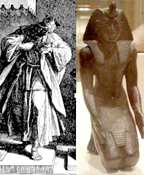
After Josiah had finished restoring the Temple, King Neco of Egypt led his army up from Egypt to do battle at Carchemish [with the King of Babylon] on the Euphrates River, and Josiah and his army marched out to fight him. But King Neco sent messengers to Josiah with this message:
"What do you want with me, king of Judah? I have no quarrel with you today! I am on my way to fight another nation, and God has told me to hurry! Do not interfere with God, who is with me, or he will destroy you."
But Josiah refused to listen to Neco, to whom God had indeed spoken, and he would not turn back. Instead, he disguised himself and led his army into battle on the plain of Megiddo. But the enemy archers hit King Josiah with their arrows and wounded him. He cried out to his men, "Take me from the battle, for I am badly wounded!"
So they lifted Josiah out of his chariot and placed him in another chariot. Then they brought him back to Jerusalem, where he died. He was buried there in the royal cemetery. And all Judah and Jerusalem mourned for him.
Josiah was one of the kings of Judah that was most dedicated to God, why did he go out to fight a battle that wasn't his? Besides that fact that the Pharaoh told Josiah that he didn't want to fight. We aren't given a lot of background in this story. We know God was sending Egypt to attack Babylon, so why did Josiah, a God-fearing king, attack Egypt? Not only did he pick this fight, but he disguised himself in order to participate in the battle. WHAT IS GOING ON!?!?

Josiah seems to have lost his marbles. He restored worship to Yahweh and got rid of ALL the idols and altars in Judah and Israel that had been made since Solomon. He did what no other king could. Many others had revivals but none as big as his. He invaded Israel to destroy the altars that had been set up there. He attacked other countries to make sure that Yahweh was worshiped. Yet when he is told by Neco that God told him to back off, he doesn't.
Sometimes we get so caught up in our own agenda that we can forget that God has a plan for other people too. It's easy for us to get nearsighted and focus on what we expect for God to do for us and through us and we forget that God works through other people in this world. Remember that sometimes God uses unlikely people to do His work. He is a God of order, but also a God of the unexpected. Keep your eyes open, He works around every corner and you need to make sure you don't hinder what He has planned.
Luke 16:9 (NIV)

I tell you, use worldly wealth to gain friends for yourselves, so that when it is gone, you will be welcomed into eternal dwellings.

Hold on…Jesus said WHAT?!?! Use our money to get friends!! I'm already doing that! SWEET! That's right. Jesus told us that we need to use what we have to make friends so that we can make an impact in eternity.

Now there is something to note here. Our wealth should be directed at making friends for a purpose. We are called to be "shrewd" like the people of this world. To use what we have in order to make an impact. A few verses later we here that "no man can serve both God and money". Our money is a tool. Much like a hammer. I use my hammer to adjust the TV set, crush ice, shut those stupid birds up who chirp at my window at 5am, and sometimes I use my hammer to pound in nails. I have never worshiped my hammer. I have never thought "this hammer makes me a better person" or "chicks dig me cause I have the most expensive hammer."
Money, like a hammer, is a tool to be used. If it is not used properly than the tool is useless. Sometimes a tool can only be misused a little, for instance using a screwdriver as a chisel or buying yet another pair of shoes despite the 20 I already have. Sometimes a tool can be grossly misused, such as using a nail gun to shoot someone or blowing your entire paycheck on booze. A tool is only as good as the person using it.
I urge you to use your money wisely.
This week I want to do a little something different. I have been reading the writings of the early church fathers lately and I found a passage in a letter to a man named Diognetus at the end of the first century. This man was a Greek who was trying to learn about the Christians. The letter was written by someone who only designated himself as "a disciple of the Apostles". He presumably wrote anonymously so as to prevent the letter being traced to him (to avoid being martyred). In chapter 5 he gives a beautiful description of how Christians are perceived and how they act in relation to the world.
After you read this I want you to email me your thoughts, whatever they are.
The Epistle to Diognetus, Chapter 5

For the Christians are distinguished from other men neither by country, nor language, nor the customs which they observe. For they neither inhabit cities of their own, nor employ a peculiar form of speech, nor lead a life which is marked out by any singularity. The course of conduct which they follow has not been devised by any speculation or deliberation of inquisitive men; nor do they, like some, proclaim themselves the advocates of any merely human doctrines. But, inhabiting Greek as well as barbarian cities, according as the lot of each of them has determined, and following the customs of the natives in respect to clothing, food, and the rest of their ordinary conduct, they display to us their wonderful and confessedly striking method of life. They dwell in their own countries, but simply as sojourners. As citizens, they share in all things with others, and yet endure all things as if foreigners. Every foreign land is to them as their native country, and every land of their birth as a land of strangers. They marry, as do all [others]; they beget children; but they do not destroy their offspring. They have a common table, but not a common bed. They are in the flesh, but they do not live after the flesh. (2 Corinthians 10:3) They pass their days on earth, but they are citizens of heaven. (Philippians 3:20) They obey the prescribed laws, and at the same time surpass the laws by their lives. They love all men, and are persecuted by all. They are unknown and condemned; they are put to death, and restored to life. (2 Corinthians 6:9) They are poor, yet make many rich; (2 Corinthians 6:10) they are in lack of all things, and yet abound in all; they are dishonored, and yet in their very dishonor are glorified. They are evil spoken of, and yet are justified; they are reviled, and bless; (2 Corinthians 4:12) they are insulted, and repay the insult with honor; they do good, yet are punished as evil-doers. When punished, they rejoice as if quickened into life; they are assailed by the Jews as foreigners, and are persecuted by the Greeks; yet those who hate them are unable to assign any reason for their hatred.
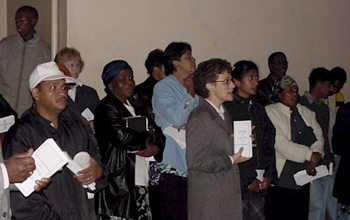
Acts 21:10-13 (NIV)
After we had been (in Caesarea) a number of days, a prophet named Agabus came down from Judea. Coming over to us, he took Paul's belt, tied his own hands and feet with it and said, "The Holy Spirit says, 'In this way the Jews of Jerusalem will bind the owner of this belt and will hand him over to the Gentiles.' "
When we heard this, we and the people there pleaded with Paul not to go up to Jerusalem. Then Paul answered, "Why are you weeping and breaking my heart? I am ready not only to be bound, but also to die in Jerusalem for the name of the Lord Jesus."

Does this leave any doubt that Paul believed in the message he preached? Would you willingly die for a lie? There are people out there who would claim that Jesus was just a man and that Paul, among others, made Him out to be the Son of God. The book of Acts was written by Luke, who also wrote the gospel that bears his name. He was a companion of Paul's through a number of his journeys, and is in fact a member of the "we" pronoun that is used in this passage.

Have you ever believed something so strongly that you were willing to be imprisoned for it? How about killed for it? I think often times we minimize this idea. Like Peter we flippantly say that we would die for our beliefs, but when the rubber meets the road where do we end up standing? Our beliefs can be like an outfit, we take it on and take it off depending on who we are with. We don't have a true understanding of what it means to sacrifice for our beliefs. What have you sacrificed for the good news of Jesus?

I sit and think back to a time when I was in High School. My mother and I had just had a fight and she was leaving for work (she worked 3rd shift) and wanted a hug before she left. I said no (mostly cause I was still angry). At which point my dad got involved and told me to hug my mother. I repeated my refusal. He saw that as an affront to his authority. He told me that if I didn't hug my mother I would be doing the dishes for a year (we didn't have a dishwasher and a family of 5 with two teenage boys makes for a lot of dishes). I remember that moment very clearly. I looked at them both and I said, "Well, I guess I better get started on those dishes then."

That is the closest most students come to standing up for what they believe. 99.9% of American kids have not been truly persecuted for their faith. Chances are you will never have a gun to your head with someone telling you to deny Christ or die. But there is a moment when you know, that what you stand for is what you will stand by. That the faith you have is real. That like Paul, you are willing to do whatever it takes to show others the good news of Jesus regardless of the consequences.

Matthew 13:33 (NLT)
Jesus also used this illustration: "The Kingdom of Heaven is like the yeast a woman used in making bread. Even though she put only a little yeast in three measures of flour, it permeated every part of the dough."

This may not seem like much when you first look at it, but it has significant implications regarding how we need to understand the Kingdom of which Jesus was teaching. Now, I don't know how much you know about baking, but Wikipedia tells me that yeast is a fungus that releases CO2 and cause bread to rise (because parts are filled with air now).

Now, it doesn't take very much yeast to do this, because yeast reproduces very quickly (primarily through asexual reproduction). But when you put a little in, it goes a long way.

What Jesus is trying to tells us is that the Kingdom of God grows inside us. Even though it seems like a small change initially, it will soon reach into every aspect of our lives. The Good news of the Kingdom should penetrate even the farthest reaches of your life. If God hasn't broken into other areas of your life, you need to ask yourself "why not?"
1 Thessalonians 5:12-15 (NLT)

Dear brothers and sisters, honor those who are your leaders in the Lord's work. They work hard among you and give you spiritual guidance. Show them great respect and wholehearted love because of their work. And live peacefully with each other.
Brothers and sisters, we urge you to warn those who are lazy. Encourage those who are timid. Take tender care of those who are weak. Be patient with everyone. See that no one pays back evil for evil, but always try to do good to each other and to all people.

Now I could go into a big thing about loving your pastors, but I'm going to go a different direction. There are many people in your lives that can be your spiritual leaders, pastors, Bible study leaders, peers, siblings, and parents. There are lots of people who give you spiritual guidance in your lives, they are all to be respected.

Mostly, I want to talk about the second part of this passage. Often times we can think that a Christian's walk is only between them and God, and in some ways it is. But as their brother or sister in Christ we have a responsibility as well. When watching "The Simpsons" becomes more appealing than showing up for Bible Study or when sports take precedence over the community of believers, we have a responsibility to encourage these back into the flock.

There are those who just need a little coaxing to come to church and Youth Group. Our hope is that through our efforts others will develop their own passion for community. If we don't make the effort to reach out to those who have lost track of their priorities then who will? Regardless of your age, economic background, education, or Bible knowledge you can be a leader in God's work.

Revelation 3:19-20
Those whom I love I rebuke and discipline. So be earnest, and repent. Here I am! I stand at the door and knock. If anyone hears my voice and opens the door, I will come in and eat with him, and he with me.

This is part of the message that Jesus gave to John for the church at Laodicea. Jesus is explaining that He disciplines because of love. This can seem a strange concept for those of us who have not had children. It is a message that is lost in a world that tries to make sure everyone is always happy. To be loved is to be corrected is to be loved.
If my friend is joking around with a loaded gun, I am going to tell him to stop. Not because I don't want him to have fun, but because I love him and don't want him hurt. I don't want him to hurt others. Jesus wants us to know that sometimes a correction now that is uncomfortable is a better option than a mistake later that can be ruining.

Parents don't discipline you because they hate you, they discipline because they love you and they want you to learn now the easy way rather than later the hard way. Say I played with a match (I know…unthinkable) when I was 5, I get spanked and sent to my room because my parents know that playing with fire is very dangerous. It is better for me to learn at 5 than to find out when I'm 15 and I set a building on fire.

It almost seems that Jesus is asking us to be ready and willing to accept his rebuke, not only that, but we should open the door and welcome it. I doubt any of you had to ever "cut your own switch". Maybe you aren't familiar with the term even. It's when you were sent out back to get a switch (part of a tree branch) with which to be disciplined with. You had to pick the stick that you got spanked with. If you picked one that was too small…well lets just say it didn't go well for you.

Jesus wants to correct the things in your life that aren't holy. He wants to refine you to be perfect. But you have to want to be changed.
1 Thessalonians 5:16-18 (Message)
Be cheerful no matter what; pray all the time; thank God no matter what happens. This is the way God wants you who belong to Christ Jesus to live.

This is a memory verse(s) that my dad had us learn as we were growing up. It is at the end of the first letter that Paul wrote to the church at Thessalonica. This is where Paul is wrapping up with how God has called us to live as followers of Christ. It most certainly is not an easy standard to live by.

Have you tried to be cheerful in all things? The King James says to "Rejoice Evermore" which means to always be rejoicing I like that version better for this. It is a lot harder (I think) to be cheerful always than to always rejoice.

What about praying all the time? If I was praying all the time then how would I do anything else?!?! Paul is trying to tells us that God wants us to bring everything to Him. God loves you and wants to talk with you.

Do I really have to thank God for WHATEVER happens? Sure, it is by His grace that we exist to have anything happen to us. That which is positive and that which is negative, neither one could happen if we didn't exist. God holds us together so that we can experience all that life with Him has to offer and His deep desire is that we find joy in Him during our lives.
The last part tells us that these things aren't optional. This is how God wants us to live. It's not a suggestion. We are commanded to live everyday like this. I encourage you to make steps toward this during this week.
Isaiah 38:17-20

Surely it was for my benefit
that I suffered such anguish.
In your love you kept me
from the pit of destruction;
you have put all my sins
behind your back.
For the grave cannot praise you,
death cannot sing your praise;
those who go down to the pit
cannot hope for your faithfulness.
The living, the living—they praise you,
as I am doing today;
fathers tell their children
about your faithfulness.
The LORD will save me,
and we will sing with stringed instruments
all the days of our lives
in the temple of the LORD.
This was a song written by a king of Judah named Hezekiah. He had been told that he would not live through the week, but after he pent time pleading with the Lord he was granted 15 more years of life. This is the end where he praises God for His mercy.

I guess this just struck me this week. I'm not really sure why. Maybe it's the part about singing with stringed instruments ;) Maybe it's the part that talks about father's telling their children about God's faithfulness. It's a common theme in the Old Testament. Maybe its about God working in our anguish and putting our sin behind Him. I really can't say.
I do know that God is faithful even when it feels like He isn't. We need to hold out hope. Hezekiah later faces the challenge of an envoy from a hostile nation that tells his people that this nation (Assyria) has destroyed countless nations whose gods could not save them, what makes Judah think their god is any different? The people remain steadfast and God avenged Himself on the Assyrian king (Sennacherib). God sent an angel that:

"…annihilated all the fighting men and the leaders and officers in the camp of the Assyrian king. So he withdrew to his own land in disgrace. And when he went into the temple of his god, some of his sons cut him down with the sword." (2 Chronicles 32:21)
Remember God is faithful and He does not take kindly to people who call Him a "sham".

Job 31:24-25,28 CEV
I have never trusted the power of wealth, or taken pride in owning many possessions…such horrible sins would have deserved punishment from God.
Job is trying to figure out why he has been suffering and he is reaching out for anything that could possibly be between him and God. He is trying to vindicate himself before God and his friends.

This section of scripture is one that we as Americans can really run into some problems. We like stuff. We like lots of stuff. Lots of expensive stuff. We have to have lots of the coolest best stuff. An mp3 player isn't an mp3 player unless its an iPod. An iPod video. An iPod video with the 80 gig hard drive.

We suffer from a market that no longer satisfies our needs. The market creates needs that we must satisfy. Unless we satisfy those needs we will be seen as inferior by our peers. I've told the story before of my friend who is a Youth Pastor in a VERY affluent neighborhood of Detroit. He drives the same 1997 Ford Ranger pickup that he had when we were in college together seven years ago. He had a student from his group come up to him and ask, "How does it feel to know that all of the kids in your Youth Group drive nicer cars than you?"
It's easy to get caught up in the hype, that you need (insert thing here) in order to be happy. When really you have everything you need in order to be truly content in life right at this very second. That it is in fact sin to crave more than you need, especially when there are others with nothing.

Matthew 6:19-21 says:
"Do not store up for yourselves treasures on earth, where moth and rust destroy, and where thieves break in and steal. But store up for yourselves treasures in heaven, where moth and rust do not destroy, and where thieves do not break in and steal. For where your treasure is, there your heart will be also.

This week I read something that I found to be very helpful to me personally. This is an excerpt from Thomas A' Kempis' book "The Imitation of Christ" published in 1418. Thomas was an Augustinian monk who (before the advent of the printing press) copied the entire Bible by hand at least 4 times. He was a devout man who loved the Lord and is well respected for his writings.
True Patience in Suffering
The Voice of Christ speaking:

What are you saying, My child? Think of My suffering and that of the saints, and cease complaining. You have not yet resisted to the shedding of blood. What you suffer is very little compared with the great things they suffered who were so strongly tempted, so severely troubled, so tried and tormented in many ways. Well may you remember, therefore, the very painful woes of others, that you may bear your own little ones the more easily. And if they do not seem so small to you, examine if perhaps your impatience is not the cause of their apparent greatness; and whether they are great or small, try to bear them all patiently. The better you dispose yourself to suffer, the more wisely you act and the greater is the reward promised you. Thus you will suffer more easily if your mind and habits are diligently trained to it.

Do not say: "I cannot bear this from such a man, nor should I suffer things of this kind, for he has done me a great wrong. He has accused me of many things of which I never thought. However, from someone else I will gladly suffer as much as I think I should."

Such a thought is foolish, for it does not consider the virtue of patience or the One Who will reward it, but rather weighs the person and the offense committed. The man who will suffer only as much as seems good to him, who will accept suffering only from those from whom he is pleased to accept it, is not truly patient. For the truly patient man does not consider from whom the suffering comes, whether from a superior, an equal, or an inferior, whether from a good and holy person or from a perverse and unworthy one; but no matter how great an adversity befalls him, no matter how often it comes or from whom it comes, he accepts it gratefully from the hand of God, and counts it a great gain. For with God nothing that is suffered for His sake, no matter how small, can pass without reward. Be prepared for the fight, then, if you wish to gain the victory. Without struggle you cannot obtain the crown of patience, and if you refuse to suffer you are refusing the crown. But if you desire to be crowned, fight bravely and bear up patiently. Without labor there is no rest, and without fighting, no victory.
Our Response:

O Lord, let that which seems naturally impossible to me become possible through Your grace. You know that I can suffer very little, and that I am quickly discouraged when any small adversity arises. Let the torment of tribulation suffered for Your name be pleasant and desirable to me, since to suffer and be troubled for Your sake is very beneficial for my soul.



Don't you love it when things are more difficult than you think they ought to be? I'd be willing to bet that you don't. We think that everything we do should be easy for us. But reality doesn't support that. The reality of our situation is that we will face trials that try us! Imagine that. They aren't called "trials" because they're easy.

Just like temptations. Temptations wouldn't be temptations if they didn't tempt us. I personally have never been tempted to use any kind of narcotic substance. Not that I wasn't offered it a time or two, but I was never tempted by it. I never had any desire for it so it was not hard for me to turn it down. But there are things that tempt me like nobody's business.
We are often challenged by events in our lives. We often struggle in our walk with the Lord. However we do have a Savior who gives us what we need to be able to overcome the struggles that we face. Does that mean its going to be easy? No. But it means that there is nothing that can have control over us that we don't LET have control over us. Christ has given us strength and has broken the bonds within which we lived, but it is still possible for us to fall, stumble, doubt.

But we know that through the name of Jesus we have the opportunity to conquer our personal demons and failings. He has given us the strength we need, will we use it?
Psalms 35:13-14 (CEV)

When they were sick,
I wore sackcloth and went without food.
I truly prayed for them,
as I would for a friend or a relative.
I was in sorrow and mourned,
as I would for my mother.
David here is lauding the idea of fasting for those who wished him harm. He is telling God in song that even though these people meant him ill, he sacrificed for their well-being. He is trying to tell God how hard he tried to be a friend to these people even though they were plotting against him.
Now think about that for a second. If sacrificing for your enemy is righteous, what about sacrificing for those who you don't know? People who don't intend to harm you. People whose only difference is being born somewhere that wasn't as prosperous as you.

That's why we fast for 30 Hour Famine. It is our goal to help others by putting ourselves in the their place for a short while. To raise money so that they will be able to eat. We are brothers and sisters in Christ with many of the kids we are helping. This is our chance to reach beyond ourselves to help other human beings who will never repay us.

That is beautiful…
Matthew 6: 14,15

For if you forgive men when they sin against you, your heavenly Father will also forgive you. But if you do not forgive men their sins, your Father will not forgive your sins.

Have you ever read these two little verses after the Lord's Prayer? These are Jesus' words and I get the idea that He puts a significant emphasis on forgiving people, what do you think? Why do you think forgiveness is such a big deal?

We have another instance where Jesus puts a huge emphasis on forgiveness. There's the parable He tells of the man who owed the king a great debt (tens of thousands of dollars) and the king forgave the debt. When the man left the king he found another guy who owed him about $20 and had him thrown in prison for not paying up. When the king heard this, he had the second man released and the man who owed the large sum thrown into prison for his wickedness. The thought being, the king forgave the man tens of thousands of dollars and he could not even let his friend off the hook for twenty dollars.

We have been forgiven so much in our lives. God has granted us forgiveness for every sin we've ever committed. Let me repeat that. God has forgiven us of EVERY SINGLE SIN WE HAVE EVER COMMITTED. So why are we so hesitant to forgive others when they sin against us? Peter asked Jesus , "How many times should we forgive, 7 times…70 times?" Jesus replied, "70 times 7." For those of you who are nitpicky that is literally 490 times.
The intention of what Jesus said was that you should forgive people all the time. Every time they sin against you. Because you have been released from such a massive debt isn't it only fair to forgive someone the small debt which they owe you?
Matthew 21:31b-32 (NIV)

Jesus said [to the chief priests and elders], "I tell you the truth, the tax collectors and the prostitutes are entering the kingdom of God ahead of you. For John came to you to show you the way of righteousness, and you did not believe him, but the tax collectors and the prostitutes did. And even after you saw this, you did not repent and believe him.

This is a fascinating little bit here. Jesus has been talking about a father who asked one of his sons to go work the vineyard, and the son said no, but later changed his mind and went out. The father (after being rejected by his first son) went to the second son and asked him the same thing, this son said he would go out to the vineyard, but he never did. Jesus then asks, "Which of the two did what his father wanted?"
Jesus was one of the most adamant proponents of "Bad People" being more holy than "Righteous People". It always amazes me to come across these things, and we can sit here and say to ourselves, "We are so much different than those 'Pharisees'", but are we?

Do we come to the cross knowing we are broken? Do we only give lip-service to the idea that we can't save ourselves? In our effort to become "holy" we forget that we can only be holy because of Christ. It was hard for religious leaders at the time to be able to say that they could not make it on their own power. It is hard now for religious leaders to say that they can't make it on their own. Think of all the high profile religious figures (pastors, priests) who have been brought down by sin. Instead of seeking help, they tried to look like they could do it all on their own.

That is why it is so much easier for "bad people" to get in. They know that they are broken and they know that they can not fix themselves, they've tried. They have the humility to come to their Heavenly Father like the prodigal son and say, "Daddy, I'm sorry. I can't make it on my own and I don't deserve your love, but if you would still accept me despite my flaws I will follow you."
Joel 2:12-15 (Contemporary English Version)

The LORD said: It isn't too late. You can still return to me with all your heart. Start crying and mourning! Go without eating. Don't rip your clothes to show your sorrow. Instead, turn back to me with broken hearts. I am merciful, kind, and caring. I don't easily lose my temper, and I don't like to punish. I am the LORD your God. Perhaps I will change my mind and treat you with mercy. Then you will be blessed with enough grain and wine for offering sacrifices to me.
Sound the trumpet on Zion! Call the people together. Show your sorrow.

Let me give you a little background here. Joel was a prophet of God to the nation of Judah (southern Israel) during the reign of the boy-king Joash. Joel prophesied at a time when there was a major famine because of a plague of locusts covering the land. The people had turned from God and were worshiping idols.
What struck me from this passage, as I was reading it the other night, was the statement "I am merciful, kind, and caring." Which is not something you necessarily think of a God that would allow such things to happen to His people, right? This is where I would, of course, beg to differ.

Part of the covenant that God had with the Israelites was that they would have no other gods other than the Lord. Think of it as a marriage covenant. God took Israel to be His bride, and when they chose to worship other gods they were committing adultery. This is very much how their relationship with God is described (numerous times in the OT and significantly in the NT). When you marry someone you are saying that you choose them above everyone else in the world, that you are theirs and they are yours for the rest of your lives. That you will not cheat on them. That's what Israel agreed to.

But as you can plainly see, they had a very hard time following through with it. Over and over, read the book of Hosea and God is VERY serious about this analogy. But no matter how many times Israel "cheats" on God with idols, He is always waiting for them to come back to Him. He IS "gracious and compassionate, slow to anger and abounding in love" (according to the NIV). God is willing to love us no matter what happens if we return to Him. There is nothing that can separate us from the love of God (Romans 8:38-39). No matter what we do, intentionally or unintentionally, God is waiting for us to come to Him.

In His mercy we will be blessed. Despite the fact that we stray He, like a husband who has overflowing love for his bride, is willing to receive her back regardless of her indiscretions. He tells them, and us, that if we come to Him with broken hearts then we can be reconciled to Him. But whether we do or not is up to us. He is Mercy, Compassion, and Love whether or not we choose to accept it. He is all this all the time. Not just when we are repentant, but always. His nature does not change based upon whether we accept Him or not. He is always ready to accept us, are you ready to accept Him?
Galatians 1:6-12 (The Message)
I can't believe your fickleness-how easily you have turned traitor to him who called you by the grace of Christ by embracing a variant message! It is not a minor variation, you know; it is completely other, an alien message, a no-message, a lie about God. Those who are provoking this agitation among you are turning the Message of Christ on its head. Let me be blunt: If one of us-even if an angel from heaven!-were to preach something other than what we preached originally, let him be cursed. I said it once; I'll say it again: If anyone, regardless of reputation or credentials, preaches something other than what you received originally, let him be cursed.
Do you think I speak this strongly in order to manipulate crowds? Or curry favor with God? Or get popular applause? If my goal was popularity, I wouldn't bother being Christ's slave. Know this-I am most emphatic here, friends-this great Message I delivered to you is not mere human optimism. I didn't receive it through the traditions, and I wasn't taught it in some school. I got it straight from God, received the Message directly from Jesus Christ.
Paul has some VERY strong words for those who try to pervert the Gospel of Jesus. He is adamant in his belief that there is nothing greater than this calling to spread the word of God. That God Himself came down among us to live and to die as a penalty for our sins. Paul knew that this wasn't popular, especially in a roman culture that expected allegiance to Caesar above all. He knew that the uncompromising position of the gospel would not bring him friends. There is one way, and that way is Christ. That's it. Paul tells us that truth is truth whether you want it be or not. I can say I "don't believe in gravity" but gravity is there whether I believe it or not. If I jump off a cliff, it doesn't matter how hard I believe that gravity is false, I fall.
Paul curses those who try to pervert the good news we have in Christ. There are those who tell us that all we need to do is "be a good person" and God will take us to Heaven. That is not true. There are millions of people who think they are doing what is good. The terrorists who destroyed the Twin Towers thought they were good. The Palestinian who straps a bomb on and blows himself up in a Jewish marketplace thinks he is doing the right and good thing. People will say that these men are extremes that are obviously wrong, but according to whose standard? If we are all doing what we believe is right and good in order to get into Heaven, what about those people whose opinion of "good" is different than ours?
This is why Paul is willing to stake it all on the crucifixion. It's the only faith story that has the Supreme Being coming down to save His creation. There are many religions that have stories of what it takes to please god, to become a god, stories of god pleasing himself, working only for his glory. There are no stories of a god who so loves his creation that he is willing to sacrifice himself, aside from ours. That is why God is capital "G". He is THE God. Many will say we are EXclusionary, but I believe that we are the most INclusive faith story. Anyone and everyone can come to the throne of Christ and be his child. That is the gospel that Paul preaches. There is nothing you can say or do to earn your salvation. You must only surrender your life to Christ and He will give you, not what you deserve, but what He has earned for you.
God is good, all the time. All the time, God is good.
2 Kings 2,4,5,6


Now you might think that this seems like a lot of scripture to cover in one week. It is. We are going to talk about a man named Elisha. Not EliJah, EliSHa. Now Elisha was the prophet who took up ministry after Elijah was taken up to Heaven. Now Elisha is not talked about nearly as often as Elijah which is odd since he is recorded doing a lot more miracles than Elijah. Through Elisha God makes a town's water drinkable, a widow has a jar of oil that never runs dry, he raises a woman's son from the dead, cures a poisoned stew, feeds a hundred with twenty loaves of bread, heals a man with leprosy, makes an iron axhead float, blinds an entire army, and even curses children who mock him. I really like that last passage. Some kids come out of a town to make fun of Elisha because he is bald and he calls two bears out of the woods and they maul the children…good stuff.
Elisha did some very amazing things, miracles that are not duplicated until Jesus does them. Even after his death Elisha did miraculous things. In 2 Kings 13 we're told that when some men were burying a man his corpse touched the bones of Elisha and he was raised to life. So why is Elisha given only 13 chapters of the Bible? After his death he is only mentioned one more time (by Jesus) in the entire Bible. Doesn't it seem someone who does so much for God would be given more recognition? There's the rub, do you think that Elisha did what he did because he was looking to be glorified for it?

Elisha was a servant of the Lord, he did what he was told and tried to make the world a better place according to God's will. A servant serves his master, not for recognition but because it is his responsibility. A servant is expected to give 100% all the time. Because that's what it means to serve. We have a crisis in our religious community that people believe that whenever they do something they need to be recognized for it. People pride themselves for helping the sick and poor, they boast in the fact that they have showed up for "x" amount of services this year, they ask recognition for donating to the cause of Christ as if these things are above and beyond what they are obligated to do.
It breaks my heart when I see this kind of thing. As servants we are expected to serve our Lord with ALL of our lives and possessions. Our life is no longer ours once we surrender it to Christ. A servant is not like an employee, who can choose to be employed or not. A servant is someone whose whole life is dedicated to doing whatever his master wants, no matter how degrading or humiliating. So giving 100% is exactly what is expected anything less is sub-par. Our human nature cries out to be recognized for every little thing we do.

Jeff Foxworthy said it: "Whatever cleaning goes on on the planet, women do 99% of it. But see, women are not as proud of their 99% as men are of our one! We clean something up, we're gonna talk about it all year long. It might be on the news, you don't know. A woman could be out re-paving the driveway. Men will actually get up, go outside and say… 'Look, don't worry about emptyin' that ashtray in the den, I done got it, all right? Did it for you, sweet pea.'"

Often we are the same way, but the thing about serving God is that we shouldn't do it to be recognized, we should do it because we love Him and His creation. Regardless of whether we are ever recognized or not, we serve because that is what is on our heart to do. I encourage you to evaluate your motivation for serving the Lord and to see who you serve, your own interest or the Almighty God.
Jude 17-23 (Contemporary English Version)

My dear friends, remember the warning you were given by the apostles of our Lord Jesus Christ. They told you that near the end of time, selfish and godless people would start making fun of God. And now these people are already making you turn against each other. They think only about this life, and they don't have God's Spirit.
Dear friends, keep building on the foundation of your most holy faith, as the Holy Spirit helps you to pray, and keep in step with God's love, as you wait for our Lord Jesus Christ to show how kind he is by giving you eternal life.
Be helpful to all who may have doubts. Rescue any who need to be saved, as you would rescue someone from a fire. Then with fear in your own hearts, have mercy on everyone who needs it. But hate even the clothes of those who have been made dirty by their filthy deeds.

As I have made mention in the last couple of weeks, I've been reading a book on Church history. I have read through the amazing challenges that Christianity has come through in the last 2000 years. It is truly amazing how right King Solomon of Israel was when he wrote "What has been will be again, what has been done will be done again; there is nothing new under the sun." Would it surprise you to know that many of the challenges that we face now as Christians the church has faced in ages past?

There have always been people who mocked the Spirit of God. There have always been people who wished harm on those who follow Jesus teachings. There have always been people who distort the truth and try to make it seem unreasonable, people who doubt not only the divinity of Jesus but also those who denied His humanity. It gives us perspective to understand history. It lets us know we are not alone and that God has triumphed in worse situations than ours. The world is wicked, but we are called to be a light to it. The world hates our light and will try to extinguish it by whatever means possible.

We are told over and over again in scripture that the only way to remain a light in the world is to immerse ourselves in the Word of God, in the Bible. To pray to and love God with all we do. This passage re-iterates these ideas. It also gives us comfort in that it shows us that doubt is normal. We must deal gently with those who have doubts and help them to work through their struggles. We are told to rescue those who need saved, "as you would rescue someone from a fire." If someone is in a fire you don't have time to think about anything (trust me I know) you either rescue them or you don't. There is no room for hesitation.

There are times when you will doubt. You will doubt yourself, you will doubt others, you will doubt God, you will doubt your calling, and that is part of life. I pray, that when you doubt, you will reach out to those around who desire to help, to encourage, to love. If you look back far enough you will find all the same arguments then that we have now. Satan's trick is that he makes us think that there is something new that "proves" that God does not exist, or that God is not what we thought He was. There is nothing new. It is the same trick he has played since the beginning. Noah's neighbors mocked him for trusting God by building an Ark. Elijah doubted that anyone else in Israel loved God even after an amazing miracle. The Jews though God had abandoned them when the were exiled to Babylon. The Pharisees tried to make faith into rules. Moneychangers turned the Temple into a marketplace.
When you doubt turn to those who love you and will support you in your walk to be a child of God. There is nothing new under the sun. There is nothing that God cannot and will not save you from.
Daniel 2:20-23 (NIV)

"Praise be to the name of God for ever and ever;
wisdom and power are his.
He changes times and seasons;
he sets up kings and deposes them.
He gives wisdom to the wise
and knowledge to the discerning.
He reveals deep and hidden things;
he knows what lies in darkness,
and light dwells with him.
I thank and praise you, O God of my fathers:
You have given me wisdom and power,
you have made known to me what we asked of you,
you have made known to us the dream of the king."

Now most people remember the prophet Daniel for his experience with the lions. Some remember Daniel for the experience here, where he is called upon to interpret the king's dream. I know that there are quite a few people who skip over this little number though.
When the answer to king Nebuchadnezzar's dream is revealed to Daniel by God, Daniel sings this praise. I love how Daniel weaves these words together. I think the most profound thing here is the joy and thankfulness. It makes me wonder if we don't show God our gratitude enough.
Have you ever prayed fervently for something? Say a sick relative… That sick relative recovered and you were happy, but did you praise God for hearing your prayers? Did you thank Him for His eternal steadfastness? Did you thank Him for His grace to you and that loved one? Have you ever truly praised God for His power?

Sure we sing songs to Him on Sundays, maybe even during the week. But to praise is something different, to be truly thankful requires effort. We often have an apathetic response to the Lover of our Soul. I know I'm just as guilty as the next man. Thankfulness is a constant struggle. Especially as Americans, we believe we got everything we wanted by our own strength. We forget to thank the one who gives us the ability to succeed.
I'm not talking about one of those "thanks God" things while you go about your business, we've all tried to get out that way. I'm talking Daniel's response. Where you realize how blessed we are to have a God that hears and loves us. One who protects us. A God that has the power to make kings and depose them, a God that has the power to change the seasons, a God that gives wisdom to the wise. Praise Him!!

I heard a question this week that stuck with me. "If God knew we were going to sin then why didn't He just keep us all in Heaven?" (Or something very similar to that) Now there are a couple of things I want to do with dissecting this. It is a question I have heard in a lot of places. There are a number of directions this conversation can take. The concepts I am going to delve into are as follows: Where do our souls come from? Does God know the future? Why would a "loving God" create us knowing we would sin? Can we know the mind of God? Now this is some pretty heavy stuff, so if clarification is needed, or if you have questions, please ask. I would love to sit down and have a serious dialogue regarding this content with anyone and everyone who is interested.

Where do our souls come from? Contrary to some beliefs, before we were conceived we did not exist. Our soul is created within our body, it is the part of us that will transcend existence but prior to creation it did not exist. There are a number of religions that either suppose that we are reincarnated or that we are angels given birth. Reincarnation is the idea that we have lived before. There is a certain number of souls that exist and when you die you are either put into another body or ascend to perfection. As Christians we believe that the evidence supports the idea that we are all individual created beings who knew nothing before our creation.

Does God know the future? The real question here needs to be, can we (who are beings encompassed in time) understand a being that is not encompassed in time? God created time, and in time He placed His creation. Think in terms of the game SimCity (or any of its derivatives). The timeline of SimCity is not the same as the timeline of reality, every ten minutes or so the game clock advances 30-50 years. Imagining that a "Sim" had cognitive powers he would be amazed at how much we knew about what was going to happen in the next 50 years. This even is a poor example since God is not held by time. He is outside of time. Much as we read a book He reads the story of humanity.

Why would a "loving God" create us with free will, knowing we would sin? This is a tough question. Is it possible to create a being with free will that will not choose to sin? Why did God put a tree in the Garden of Eden that Adam and Eve could not eat of? It seems it would have been a lot easier if God had just not put the Tree of the Knowledge of Good and Evil in the Garden of Eden, then Man would not have had the opportunity to eat of it and fall away from God. Let me put it to you in this way… When you were born, did your parents know you would sin? Do they have an ideal that they want you to achieve? Do you ever fall short of that ideal? Does that mean you should not have been born? God, like a loving parent, knows that we will not always live up to what we were created for, but He allows us to continue so that we can learn.

Can we know the mind of God? Now all of the above hinges on the concept that we can know the mind of God. I have never existed as "God" myself so I cannot truly understand all that He is and does. An ant cannot understand why man does what man does, because his experience is so far removed from a man's. An ant lives to serve his queen, he runs everywhere, he can lift 50 times his body weight, he communicates by smell, he has 6 legs, he lives in a hole, he is never alone. A man is umpteen million times an ant's size. The ant can't comprehend the idea of individuality his picture of the universe is limited by his experience. We can only know what we have experienced, we cannot truly imagine an existence without time, we cannot truly grasp why God would create life knowing that it could choose to hate Him.

Again I want to reiterate that this is but a small picture of this discussion. There are hundreds of people (potentially thousands) that have written big thick books on each of these subjects. Suffice it to say, we are not God and we cannot understand why God does all that He does (or doesn't). We have been given a Savior and a Book that tell us what God expects of us, what God has done. We take what we can know and run with it and trust that God will work out the rest. That is true faith.
Luke 21:1-4 (NIV)
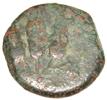
As he looked up, Jesus saw the rich putting their gifts into the temple treasury. He also saw a poor widow put in two very small copper coins. "I tell you the truth," he said, "this poor widow has put in more than all the others. All these people gave their gifts out of their wealth; but she out of her poverty put in all she had to live on."
The thing about this passage is it is all about motives. It's not what you give, it's how you give it. This is reiterated in Acts 5 and 2 Corinthians 9. Motives are so important when it comes to giving something to God. He wants us to give humbly and to give with all our heart. I want to point out that God doesn't need the money, or the things, or the whatever you are giving. He wants to know that He has your heart. He wants to see the love with which you give.

I heard it once put in terms of ethics. You have two people, both of them have the opportunity to steal money while no one is looking. One doesn't do it because he's worried about being caught, the other doesn't because he thinks it's wrong. The outcome is the same, neither one stole the money, but one is an ethical person and the other is not.
In this story a poor widow (in New Testament times a widow was as good as a beggar half the time) gives two of the very smallest coins available. While there are rich people around putting in bags and bags of money she puts in just little coins. Sometimes all we have to offer is a little bit, but when God sees we are responsible with a little bit, He gives us more. Be responsible with what you have and give to God with a right heart and He will be sure to give you the opportunity to give more.
Ezekiel 34:1-6 (The Message)

"God's Message came to me: "Son of man, prophesy against the shepherd-leaders of Israel. Yes, prophesy! Tell those shepherds, 'God, the Master, says: Doom to you shepherds of Israel, feeding your own mouths! Aren't shepherds supposed to feed sheep? You drink the milk, you make clothes from the wool, you roast the lambs, but you don't feed the sheep. You don't build up the weak ones, don't heal the sick, don't doctor the injured, don't go after the strays, don't look for the lost. You bully and badger them. And now they're scattered every which way because there was no shepherd-scattered and easy pickings for wolves and coyotes. Scattered-my sheep!-exposed and vulnerable across mountains and hills. My sheep scattered all over the world, and no one is out looking for them!"

 Now first of all let me explain a concept called metaphor. A metaphor is a figure of speech in which a term or phrase is applied to something to which it is not literally applicable in order to suggest a resemblance. So we are not talking about actual sheep here. Sheep is a metaphor for people. The book of Ezekiel was written while the Israelites were in exile in Babylon. This part is a rebuke of those who were leaders in Israel and who used and abused the common man for their own personal gain and did not care for them as they should have.
Now first of all let me explain a concept called metaphor. A metaphor is a figure of speech in which a term or phrase is applied to something to which it is not literally applicable in order to suggest a resemblance. So we are not talking about actual sheep here. Sheep is a metaphor for people. The book of Ezekiel was written while the Israelites were in exile in Babylon. This part is a rebuke of those who were leaders in Israel and who used and abused the common man for their own personal gain and did not care for them as they should have.
Now this has significance to us as New Testament Christians as well. We are the "new covenant" which just means that we are God's messengers for this world. We spread the news of salvation from sins and we are called to care for people as Jesus would have. We are the new shepherds. We are the ones who are to care for the sick, the poor, and the injured. We are to find the lost and rescue the strays. We are blessed so that we may bless others. We are not given this charge to selfishly fill ourselves and make ourselves happy.

We are all given time to make an impact on eternity and we will all have that chance. America is one of the richest nations in the world. North America has 6% of the adult population and controls 34% of the wealth. Here's a stat that will knock you on your duff. If we took the mean average of all the money people in the US had and split it evenly, each person would have $144,000. Now compare that to India with $1,100 per person, Indonesia with $1,400. We have been blessed, but are we in turn blessing others? Are you blessing others, or do you horde money and possessions for yourself?

Jesus tells a parable about a rich man in Luke 12. The man finds that he has had an amazing harvest that he cannot fit it all in his barns. His solution: tear down his barns and build bigger ones. Then he says to himself, "You have plenty of good things laid up for many years. Take life easy; eat, drink and be merry." But God says, "You fool! This very night your life will be demanded from you. Then who will get what you have prepared for yourself?"

I remember this story from when I was little, my dad would read to me and I remember the picture of the barns in the devotion book we used. I remember being told that we have a responsibility to use what we are given to help others. This season as we enjoy all the cool things that we get, please remember that there are those who have nothing and it is our responsibility to share what we have been given with them.
Luke 1:76-79 (NIV)

And you, my child, will be called a prophet of the Most High;
for you will go on before the Lord to prepare the way for him,
to give his people the knowledge of salvation
through the forgiveness of their sins,
because of the tender mercy of our God,
by which the rising sun will come to us from heaven
to shine on those living in darkness
and in the shadow of death,
to guide our feet into the path of peace.

This is the prophesy that John the Baptist's father gave when John was born. Now John the Baptist was the guy who lived in the desert, wore camel hair shirts, ate bugs and honey, just the kind of guy you would want to bring home to meet your parents, ladies. He is the guy who baptizes Jesus. John also gets his head chopped off by Herod later because John tells Herod that Herod should not sleep with his brothers wife. Gross.
John the Baptist sets up the whole Salvation story by proclaiming that a Savior is coming. He has an important part of our understanding of who Jesus is and what Jesus has come to do. He is a messenger of joy.

Now you may say "Nathan, we realize that John the Baptist was an important person in the Bible, but what does that have to do with me?"

This week I'm keeping it simple. We each have a part to play in how the Gospel (good news) is played out in our world, to our friends and family, strangers, and even those we don't like. The prophecy here is about how John will prepare the way of the Lord, but most of it talks about how God's mercy will be a light to those in the world. At the end of the day, let us hope that our lives point people to God's grace and goodness, and not to ourselves.
Luke 7:36-47 (The Message)

One of the Pharisees asked [Jesus] over for a meal. He went to the Pharisee's house and sat down at the dinner table. Just then a woman of the village, the town harlot, having learned that Jesus was a guest in the home of the Pharisee, came with a bottle of very expensive perfume and stood at his feet, weeping, raining tears on his feet. Letting down her hair, she dried his feet, kissed them, and anointed them with the perfume. When the Pharisee who had invited him saw this, he said to himself, "If this man was the prophet I thought he was, he would have known what kind of woman this is who is falling all over him."
Jesus said to him, "Simon, I have something to tell you."
"Oh? Tell me."
"Two men were in debt to a banker. One owed five hundred silver pieces, the other fifty. Neither of them could pay up, and so the banker canceled both debts. Which of the two would be more grateful?"
Simon answered, "I suppose the one who was forgiven the most."
"That's right," said Jesus. Then turning to the woman, but speaking to Simon, he said, "Do you see this woman? I came to your home; you provided no water for my feet, but she rained tears on my feet and dried them with her hair. You gave me no greeting, but from the time I arrived she hasn't quit kissing my feet. You provided nothing for freshening up, but she has soothed my feet with perfume. Impressive, isn't it? She was forgiven many, many sins, and so she is very, very grateful. If the forgiveness is minimal, the gratitude is minimal."

Here we have the kind of situation that really grinds my gears. You have a religious figure who looks down on Jesus for associating with a sinner. You have a prostitute who comes in and weeps at Jesus feet and then dries his feet with her hair before anointing Jesus feet with the perfume. The religious figure becomes indignant that Jesus would associate with "her kind" of people. Trust me I have dealt with this significantly in my time as a minister. You will have people who malign those students who they do not perceive to be religious.

"I don't want my good student hanging out with that kind of kid!" We have this misconception that Jesus only loves those who dress a certain way and do certain things (and don't do other things). I have heard it all before, "I don't know that I want to bring him to church, he is always cussing," "We don't want any kids here who smoke," "Those two don't belong in youth group, they're have pre-marital sex." We have this notion that sinners don't belong in church, that God does not love them. We forget that the saving work of Christ is for all people no matter what their sin. You are not yet perfect and you know the truth, how can you be angry at the darkness for being dark?!?

Let me say it as plain as day, I want sinners in youth group. I want people who cuss at youth group, I want people who do drugs at youth group, I want people who have sex at youth group, I want people who hate God at youth group, and guess what… I want you to invite them. Now I will not tolerate most of these behaviors at youth group, but those who have much that is forgiven will be that much more grateful for the saving work of Christ.

There is so much beauty that we miss out on when we shuffle students from one youth group to another as opposed to truly reaching out to those who are hurting and in need of a Savior.
Matthew 26:31-35 (NIV)
Then Jesus told them, "This very night you will all fall away on account of me, for it is written:
'I will strike the shepherd, and the sheep of the flock will be scattered.'
But after I have risen, I will go ahead of you into Galilee."
Peter replied, "Even if all fall away on account of you, I never will."
"I tell you the truth," Jesus answered, "this very night, before the rooster crows, you will disown me three times."
But Peter declared, "Even if I have to die with you, I will never disown you." And all the other disciples said the same.

Sometimes we don't even realize it do we? How much one decision can change our lives, how much one decision can affect our walk with God. Most people who fall away from God don't do it all at once. It happens gradually, slowly. Small concessions are made. We think "Oh I don't have to go to church this week," or "I can stop reading my Bible for a week, it'll be okay." I'm not going to say that suddenly because you stop bathing yourself in the glory of God that you will suddenly be shooting up drugs, pimping or being pimped on street corners, and putting cats in microwaves. Most people who fall away don't end up going to ridiculous extremes, its much more subtle.

This is where Satan really can gain ground. We think "Oh, I'm not doing anything real bad. I still believe in God, I just don't think I need to (insert whatever it is here) in order to be loved by Him." Satan wins by introducing in our lives APATHY or FEAR. I know you know what fear is. Apathy is simply the act of not caring. An apathetic person doesn't care what happens, bad or good. It's easy to know we are making a mistake when we do something "big" like killing someone or engaging in extra-marital sex.

Most of the time we have good intentions. We assume that making something a priority ahead of God for a little while will be okay, we can come back to Him and He'll still love us. That is true, but what if you decide not to come back. What if your fire burns out or gets banked? That is what Peter runs into here. He is fired up to stay by Jesus no matter what, willing to die even. But less than 12 hours later he is right where he was told he would be, denying Jesus 3 times. He became afraid that he would be killed for his belief. For many of us, as I said, its more subtle. We decide to skip out on God for a sport, or a certain group of friends, a boyfriend/girlfriend. I don't want to name any particular event because then someone will think I'm picking on them. But things I've heard in the past: work, football, cheerleading, band, softball, work, parties, boyfriend, a play, on and on and on.

It's easy to make a stand when nothing is standing against us. When there was no one standing there threatening Peter he was very brave, but when the rubber hit the road he did not stick to his convictions. Unless you make a stand early you will never stand on your own. My parents made the initial stand for me. They told me, when I got my first job, that under no circumstances was I allowed to work on Sundays or Thursday nights (which was when my youth group was). If I did allow myself to be scheduled during those times I would be forced to quit, which meant I would make not money, which meant I would not be able to keep my car.

For me that taught me that I needed to set my boundries early. Whatever it is for you, telling your "significant other" that you WILL NOT under any circumstance be alone with them in a parked car or either home, or its telling your boss/coach that you will not give up your church/bible study/youth group time for any event that they plan. Sure these actions have potential consequences, but all actions have consequences. I would think you would value your spiritual well-being over a part time job, a part time boyfriend/girlfriend, or some sport that you will not play past High School/College. But that's just me…
Philippians 4:4-7 (NIV)
Rejoice in the Lord always. I will say it again: Rejoice! Let your gentleness be evident to all. The Lord is near. Do not be anxious about anything, but in everything, by prayer and petition, with thanksgiving, present your requests to God. And the peace of God, which transcends all understanding, will guard your hearts and your minds in Christ Jesus.

Peace. It's something we long for, isn't it? No one wants people to be injured or killed in war. We would rather avoid conflict and live in harmony with others. No one begins their school year thinking, "I wonder how many enemies I can make this year?" In our hearts we want to be accepted and be at peace with others. More importantly we want to be at peace with ourselves.

It seems that we have a harder time being at peace with ourselves than with others. As followers of Christ we find our spiritual desires conflicting with our physical desires. We know better than to lie, but we don't want to get in trouble. We try to be sexually pure for our future spouse, but the latest boyfriend/girlfriend is SOOOOO cute and going a little further isn't going to hurt anything. It's a good idea to read my Bible every day, but I'm just so tired/busy.

So we have all this conflict and we have our outer conflicts with others, and with our circumstances. Why does Paul tell us to not be anxious? He says to rejoice. He says God brings peace. This peace is more than just the absence of conflict. This peace is something that permeates our entire being. It's not apathy, it's more poignant than that. It is giving our concerns up to God, to petition Him to take away our anxiety. God can not and will not take away all our conflicts. He can give us peace in all things. There are trials that we must endure, trials we have brought on ourselves, trials that are just the product of living in a sinful world. Peace is a much more desirable and realistic attribute to receive than a life without conflict.
So what does this mean for us? It means that we have so much in our lives that struggles against the peace we were meant to have. Things within and outside of our control. It helps to bring peace when we admit what we struggle with. What prevents you from having peace? What frightens you? Is it an interpersonal conflict? Is it sin? Is it a lack of ambition? When and if you choose to answer this question via email, remember it is confidential. No one else will know. I will not post answers. It's a little more work than the other questions this week. You can keep it simple as a sentence or you can elaborate into a paragraph, heck you might even write a book. What prevents you from having true peace?
Titus 3:1-2 (NIV)
Remind the people to be subject to rulers and authorities, to be obedient, to be ready to do whatever is good, to slander no one, to be peaceable and considerate, and to show true humility toward all men.

This week's lesson is nice and simple. It's laid out in plain words that even you public school kids can understand…;) LOL!! However I might point out, that simple does not always mean easy. I think the best analogy for this is football team's defense. The defensive line of a football team's job is to prevent the offense of the other team from moving up the field. Very simple, make sure "they" don't get any further up the field than they currently are. Is that easy? No, because the offense is devising new ways to try to get past the defense.

Much the same, we have a simple command to follow. Jesus said, "Come, follow me." But because it is simple, many people think it will be easy. The problem is that our very nature fights against our heart. This is why you see so many people who fall away from Christendom, they were told that it's "easy to become a Christian" when in truth it is very hard. Let me explain. Christian simply means one who follows Christ. Is it easy to be "one who follows Christ"? It is very simple. Christ made it so we can all understand and we can all take the steps, but that does not mean it is easy. Here are some definitions:

Easy - not hard or difficult; requiring no great labor or effort
Simple - not complex
Often we use these words interchangeably. But they are very different, one denotes the effort that needs to be exerted, the other describes complexity. Raking the lawn is simple, there is nothing complex regarding raking the lawn. No advanced mathematics you need to know, no training you need to complete, no special tools. Just you, your rake, and some time. It is simple. But it requires effort to be exerted, chances are good you will sweat, that you will be sore the next day (depending how many trees are in your yard). It is simple not easy.
It is simple to be humble, considerate, obey, to strive to do good, to not talk bad about others, to obey the law…but that does not mean it will always be easy.
Mark 9:42-47 (NIV)

And if anyone causes one of these little ones who believe in me to sin, it would be better for him to be thrown into the sea with a large millstone tied around his neck. If your hand causes you to sin, cut it off. It is better for you to enter life maimed than with two hands to go into hell, where the fire never goes out. And if your foot causes you to sin, cut it off. It is better for you to enter life crippled than to have two feet and be thrown into hell. And if your eye causes you to sin, pluck it out. It is better for you to enter the kingdom of God with one eye than to have two eyes and be thrown into hell…
Wow. Jesus has some very harsh words regarding sin, doesn't he? We tend to marginalize sin. We tend to try to make sin sound less offensive than it is. To put it frankly, sin is an affront to God. Every time we sin, we pervert what God intended us for. We take something that was beautiful and turn it into something vile. We are fortunate that Jesus died for our sin, in order to buy forgiveness.

But let's think about this for a second. If Jesus knew His purpose (and He did), and He knew that you would accept His offer of mercy (and He did), why does He still have such drastic words for dealing with sin?

It's easy for us to justify our sin. "Oh, well I only did that because of this…", "It was only a little lie.", "Well he started it.", etc, etc. Jesus wants us to remember that sin is not a laughing matter. Sin is serious business. So much so that He tells us its better for us to cut off a part of our anatomy than to allow it to allow us to be ruled by sin. How much more so are we to cut ourselves off of certain situations to prevent sin? If you find yourself always gossiping with "such and so", then maybe you need to stop. How about if you always end up groping your boyfriend/girlfriend at their house when their parents are gone, maybe you shouldn't go over there without supervision?
Jesus tells us that sin is serious business. Its not something to joke about, especially if you are causing another person to sin. Please make an effort in your lives to put off sin and endeavor to become more like Christ.
1 Samuel 3:1-10 (NIV)
The boy Samuel ministered before the LORD under Eli. In those days the word of the LORD was rare; there were not many visions.
One night Eli, whose eyes were becoming so weak that he could barely see, was lying down in his usual place. The lamp of God had not yet gone out, and Samuel was lying down in the temple of the LORD, where the ark of God was. Then the LORD called Samuel.
Samuel answered, "Here I am." And he ran to Eli and said, "Here I am; you called me."

But Eli said, "I did not call; go back and lie down." So he went and lay down. Again the LORD called, "Samuel!" And Samuel got up and went to Eli and said, "Here I am; you called me."
"My son," Eli said, "I did not call; go back and lie down."
Now Samuel did not yet know the LORD: The word of the LORD had not yet been revealed to him.
The LORD called Samuel a third time, and Samuel got up and went to Eli and said, "Here I am; you called me."
Then Eli realized that the LORD was calling the boy. So Eli told Samuel, "Go and lie down, and if he calls you, say, 'Speak, LORD, for your servant is listening.'" So Samuel went and lay down in his place.
The LORD came and stood there, calling as at the other times, "Samuel! Samuel!"
Then Samuel said, "Speak, for your servant is listening."
It's weird how God's voice can sound like so many other things. How often we can miss it because of all the things going on in our lives. Samuel heard God 3 times and yet did not know who He was. He thought God was the priest calling him. It took Eli 3 times to consider the possibility that maybe God was trying to talk to Samuel.
Now Samuel was a great prophet (eventually). He crowned the first and second kings of Israel, Saul and David. What if Samuel hadn't answered God? What if he had been too afraid? What if he hadn't had a mentor to encourage him? So many "if"s. How would that have affected Israel? What about the Bible? What about Christianity?? (this paragraph is rhetorical therefore it does not count for the game)

We run into a similar situation in Isaiah chapter 6. God asks who He can send to the people with His message. Isaiah replies "Here I am, send me." I imagine that Isaiah was enthusiastic when he was given the opportunity to be God's messenger. Not that it was very easy both prophets suffered at times for their message. (I mean look at the message God gives to Isaiah in the next couple of verses 6:9-10) Can anyone tell me how Isaiah died? (that one is for the game)

If we want God to be active in our lives we need to be able to listen to Him. We have to actively try to keep our eyes open for the opportunities that He presents us with. We will not always have someone beside us who says, "Maybe God is trying to tell you something." I think better that WWJD (what would Jesus do) bracelets would be IGTTTMS (is God trying to tell me something) bracelets. Okay, so maybe it doesn't roll off the tongue as well as WWJD, but that doesn't mean its not true. God has truth for us, we just need to be ready to hear it.
Matthew 18:15-17 (NIV)
"If your brother sins against you, go and show him his fault, just between the two of you. If he listens to you, you have won your brother over. But if he will not listen, take one or two others along, so that 'every matter may be established by the testimony of two or three witnesses.' If he refuses to listen to them, tell it to the church; and if he refuses to listen even to the church, treat him as you would a pagan or a tax collector."

Now in some ways this is a very simple passage. If you feel a fellow Christian has wronged you are supposed to talk to them about it. Discuss it between the two of you and try to come to an understanding. If that doesn't work you have a few other people come in and try to mediate in order that the truth may be known and an understanding reached, whether that be forgiveness, and apology, or something else. If that doesn't work then you need to take it before the congregation (or the pastor in modern time) in order to resolve the matter. If all that doesn't work then the person is obviously not repentant for the mistake made and should be treated as a non-believer.

Now lets get to the nitty gritty of the situation. It's not easy to confront someone who has wronged you. It's a lot easier to talk about it with other people. So we end up with a situation in which you have a conflict with another Christian and you talk about it with everyone except that person. Nothing gets resolved, feelings get hurt, you sin by gossiping, and the problem gets blown out of proportion. I have known people who have been both guilty of this as well as people who have been hurt by it. I'm sad to say I have been on both the giving and receiving end at different times in my life. I need to be very firm in saying that the way Jesus gives us for dealing with conflicts with our brothers and sisters in Christ is truly the best one.

Now this does not give you license to go up to someone and tell them "exactly what you think of them." That is not the purpose here. This is about resolving conflict in a loving and careful way. I am not proposing that you go out and find that person who has so frustrated you with their inconsiderate nature and demand that they apologize or leave the church. That's just ridiculous. This is about dealing with conflict in a Christ-like way. If you feel there was a mistake made in the handling of a situation then you talk to the person who made the mistake. Don't talk to their neighbor, don't talk to their friends, don't talk to their boss, don't talk to your friends about it. Talk to the person who you feel made the mistake. It's so simple, but it is so hard to do. I encourage you to step out of your comfort zone and handle your conflict in a positive way.
Psalm 23 (NLT)
The LORD is my shepherd;
I have all that I need.
 He lets me rest in green meadows;
He lets me rest in green meadows;
he leads me beside peaceful streams.
He renews my strength.
He guides me along right paths,
bringing honor to his name.
Even when I walk
through the darkest valley,
I will not be afraid,
for you are close beside me.
Your rod and your staff
protect and comfort me.
You prepare a feast for me
in the presence of my enemies.
You honor me by anointing my head with oil.
My cup overflows with blessings.
Surely your goodness and unfailing love will pursue me
all the days of my life,
and I will live in the house of the LORD forever.
Okay this is one I know you've heard. I think there is so much to learn from the passage. I think we need to start with the fact that David wrote this song. He was a shepherd. So we need to look at this passage from his eyes.

David is standing there and watching his sheep, he begins to think about how God watches over us like he (David) watches the sheep. He is struck in a profound moment with how beautiful this is. God, like a shepherd, makes sure His sheep never need anything, He takes care of us. He gives us rest in our hearts, much like a shepherd brings the sheep to a safe place to eat and drink. A shepherd does not take his sheep to barren ground and raging rivers, there is no way they could survive there. He makes sure we have the strength to carry on. We are told by Paul in 1 Corinthians that, "No temptation has seized you except what is common to man. And God is faithful; he will not let you be tempted beyond what you can bear."
There is nothing for us to worry about because God is guiding us. He is taking us where He desires us to be. A place of peace. We need not even fear death! Because we know He waits for us after. To quote a famous hymn, "Where O death is thy sting!" God has been with us the whole way and will continue to aide us.

His rod and staff comfort us. While they can be used for correction they are also used to protect us from predators. A staff was used both to guide sheep as well as to fight off bears, wild dogs, and lions. You may not realize this, but shepherds were brave, tough people. They would fight off all manner of wild animal with nothing more than a stick and a sling. Can you imagine standing up to a bear (no matter how big) with nothing more than a stick? THAT'S GUTS!
We are prepared a table in the midst of our enemies. Shepherds took sheep out into the wilderness to feed them. Sheep are helpless critters. They really have no natural defense. Imagine taking a helpless animal out into a meadow, where there is the possibility of being attacked predators. But God protects us.
It's amazing to me. David looked at what he did, and saw God in it. He was able to explain the complexities of an eternal, all-powerful God in a simple analogy that denotes power and love. Could you do the same?
1 Samuel 1:10-11,19b-20 (NIV)
In bitterness of soul Hannah wept much and prayed to the LORD. And she made a vow, saying, "O LORD Almighty, if you will only look upon your servant's misery and remember me, and not forget your servant but give her a son, then I will give him to the LORD for all the days of his life, and no razor will ever be used on his head."
…and the LORD remembered her. So in the course of time Hannah conceived and gave birth to a son. She named him Samuel, saying, "Because I asked the LORD for him."

So here we have a piece of scripture that I have not heard a lot on (aside from devotions when I was a kid). You have a woman who is barren (meaning she can't have children) who is horribly distraught because of it. She is at the Tabernacle (the place where the ark rested before the temple) and she is praying. She is actually praying so fervently and passionately that the priest thinks she is drunk! The Lord hears her prayer and she gets a son, whom she turns over into the Lord's service in the care of the priests.
There are a number of things I could talk about from this passage…the faithfulness of the Lord to His people, how God answers prayer, the sacrifice of Hannah, the amazing way the Lord uses odd circumstances to bring about some of His most powerful messengers, or half a dozen other things. So what will I talk about?
Do you know who Samuel was? Samuel was a POWERFUL prophet of God. He speaks with God, anoints King David and King Saul, is a Judge of Israel, and ends up rejecting Saul as King. So he sets up the first kings of Israel and then tells them what they are doing wrong. This guy has some serious courage. Maybe he trusts God implicitly?

I know, I still haven't gotten to my conclusion. What if I don't have one? What if I expect you to think on what was written and then tell me what you learned from this passage this week? So many potential topics to contemplate. Which one will you pick? Email or IM me and tell me what you think is the most amazing thing about this passage.
1 Corinthians 7:17-24
And don't be wishing you were someplace else or with someone else. Where you are right now is God's place for you. Live and obey and love and believe right there. God, not your marital status, defines your life. Don't think I'm being harder on you than on the others. I give this same counsel in all the churches.
Were you Jewish at the time God called you? Don't try to remove the evidence. Were you non-Jewish at the time of your call? Don't become a Jew. Being Jewish isn't the point. The really important thing is obeying God's call, following his commands.
Stay where you were when God called your name. Were you a slave? Slavery is no roadblock to obeying and believing. I don't mean you're stuck and can't leave. If you have a chance at freedom, go ahead and take it. I'm simply trying to point out that under your new Master you're going to experience a marvelous freedom you would never have dreamed of. On the other hand, if you were free when Christ called you, you'll experience a delightful "enslavement to God" you would never have dreamed of.
All of you, slave and free both, were once held hostage in a sinful society. Then a huge sum was paid out for your ransom. So please don't, out of old habit, slip back into being or doing what everyone else tells you. Friends, stay where you were called to be. God is there. Hold the high ground with him at your side.

I have heard, a number of times, "Nathan, where does God want me to serve?" I say it's very simple, where are you right now? I know they are looking for poignant and deeply theological answers, but frankly there isn't one. God has put us into a place where He wants us to serve. We are equipped with the potential to serve God where we are in life. God would not give us a challenge we could not overcome. Does that mean we will always be where we are now? No. There are other challenges that come and we grow as people and as Christians. Will you always be a teenager? Will you always be a 20-something? No! You grow and where you are changes, the challenges change, and the world changes. That's the nature of things.
So what does this mean? What is Paul saying? There is a reason that I am in an abusive situation? There is a reason I hate my job? I should stay here??!?!?!? No, that's not what he's saying. Notice what he says to slaves… He says that if you have the opportunity to improve your situation, take it. However, he is saying that there are things that we deal with that we just need to be content in.  Say a teen becomes a Christian and their parents are not. Should that teen leave home and find an atmosphere more conducive to a Christian? No. Say you are punk rock skater type, or a nerdy geeky type, or a preppy type and you become a Christian, does that mean you have to change who you are to be acceptable to God? NO! God calls people to be who they were created to be. I was created to be a goofy, chubby, balding guy who likes music and motorcycles, a guy who loves God. My job is to be the best person God created me to be. Now does that mean if I'm offered the opportunity to exchange chubby for skinny and muscled or bald for afro that I'm not supposed to take it? No, it just means being content with where you are until another opportunity to glorify God with who you are and who you can become comes along.
Say a teen becomes a Christian and their parents are not. Should that teen leave home and find an atmosphere more conducive to a Christian? No. Say you are punk rock skater type, or a nerdy geeky type, or a preppy type and you become a Christian, does that mean you have to change who you are to be acceptable to God? NO! God calls people to be who they were created to be. I was created to be a goofy, chubby, balding guy who likes music and motorcycles, a guy who loves God. My job is to be the best person God created me to be. Now does that mean if I'm offered the opportunity to exchange chubby for skinny and muscled or bald for afro that I'm not supposed to take it? No, it just means being content with where you are until another opportunity to glorify God with who you are and who you can become comes along.
Whatever you do, you are called to hold the banner high and not slip back into your sinful ways. Trade the unsanctified for the sanctified. Give up the wicked for the holy. You have been bought at a great price. There is a place prepared for you. Jesus says, "Do not let your hearts be troubled. Trust in God; trust also in me. In my Father's house are many rooms; if it were not so, I would have told you. I am going there to prepare a place for you. And if I go and prepare a place for you, I will come back and take you to be with me that you also may be where I am." (John 14:1-3 [NIV])
Acts 17:16-31 (The Message)
The longer Paul waited in Athens for Silas and Timothy, the angrier he got—all those idols! The city was a junkyard of idols.
He discussed it with the Jews and other like-minded people at their meeting place. And every day he went out on the streets and talked with anyone who happened along. He got to know some of the Epicurean and Stoic intellectuals pretty well through these conversations. Some of them dismissed him with sarcasm: "What an airhead!" But others, listening to him go on about Jesus and the resurrection, were intrigued: "That's a new slant on the gods. Tell us more."
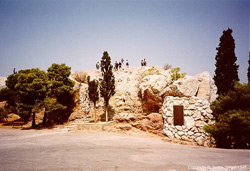
These people got together and asked him to make a public presentation over at the Areopagus, where things were a little quieter. They said, "This is a new one on us. We've never heard anything quite like it. Where did you come up with this anyway? Explain it so we can understand." Downtown Athens was a great place for gossip. There were always people hanging around, natives and tourists alike, waiting for the latest tidbit on most anything.
So Paul took his stand in the open space at the Areopagus and laid it out for them. "It is plain to see that you Athenians take your religion seriously. When I arrived here the other day, I was fascinated with all the shrines I came across. And then I found one inscribed, to the god nobody knows. I'm here to introduce you to this God so you can worship intelligently, know who you're dealing with.
"The God who made the world and everything in it, this Master of sky and land, doesn't live in custom-made shrines or need the human race to run errands for him, as if he couldn't take care of himself. He makes the creatures; the creatures don't make him. Starting from scratch, he made the entire human race and made the earth hospitable, with plenty of time and space for living so we could seek after God, and not just grope around in the dark but actually find him. He doesn't play hide-and-seek with us. He's not remote; he's near. We live and move in him, can't get away from him! One of your poets said it well: 'We're the God-created.' Well, if we are the God-created, it doesn't make a lot of sense to think we could hire a sculptor to chisel a god out of stone for us, does it?
"God overlooks it as long as you don't know any better—but that time is past. The unknown is now known, and he's calling for a radical life-change. He has set a day when the entire human race will be judged and everything set right. And he has already appointed the judge, confirming him before everyone by raising him from the dead."
Here Paul finds himself debating the key philosophical scholars of Greece. The Areopagus (also called Mars Hill) was the place in Athens that originally had been the council of elders. At the time of Paul it was used as a place of trial, principally for murder. Wise judges would gather to make decisions based upon the facts. So it seems fitting that Paul would find himself here discussing the murder of the Savior.

Paul gets to Athens and is waiting for his friends to show up and while waiting he began to get upset. He saw all of the idols that the Athenians had to various Gods. He had a couple of choices. He could just wait and keep his mouth shut and when his friends got there leave, the whole while talking about how evil the place was. Or he could confront the situation. Knowing Paul its easy to predict what would go down. He decides that he's not going to just sit around and let this opportunity pass by.
He begins talking to people in the streets. After a little while he gets invited to debate the idea in a local court by some philosophers, and this is the main thrust of my point, and he begins by telling them they are very religious. He doesn't begin with how wicked they are, he doesn't pronounce Hell on them, he simply takes what they are doing and turns it around. He uses their momentum in order to carry them from where they are to where they need to be. If you studied martial arts, you would find that with most forms you use your opponents force to defend yourself.  You don't stop a punch, you use their momentum to continue their punch past you and exaggerate the movement until you are safe. That's basically what Paul does here. He says, "I see you are very religious, I even saw an altar to the unknown god. Let me tell you about this god whom you do not know." It's masterful.
You don't stop a punch, you use their momentum to continue their punch past you and exaggerate the movement until you are safe. That's basically what Paul does here. He says, "I see you are very religious, I even saw an altar to the unknown god. Let me tell you about this god whom you do not know." It's masterful.
Rather than challenging the people on what they are doing wrong, he meets them where they are. He takes what they do right and shows them how to take it to the next level. He takes their natural desire to worship God, which they have perverted, and shows them how they can fulfill that desire in the way it was supposed to be.
Psalm 142 (The Message)
I cry out loudly to GOD, loudly I plead with GOD for mercy.
I spill out all my complaints before him,
and spell out my troubles in detail:
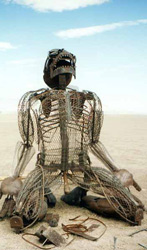 "As I sink in despair, my spirit ebbing away,
"As I sink in despair, my spirit ebbing away,
you know how I'm feeling,
Know the danger I'm in,
the traps hidden in my path.
Look right, look left—
there's not a soul who cares what happens!
I'm up against it, with no exit—
bereft, left alone.
I cry out, GOD, call out:
'You're my last chance, my only hope for life!'
Oh listen, please listen;
I've never been this low.
Rescue me from those who are hunting me down;
I'm no match for them.
Get me out of this dungeon
so I can thank you in public.
Your people will form a circle around me
and you'll bring me showers of blessing!"
David was depressed, when he thought things couldn't get worse, they did. At the time of the writing of this Psalm David was stuck in a cave. Whenever David is stuck in a cave, someone is invariably trying to kill him. So needless to say, his frustration and despair were justified. Sometimes it can feel as though we have no refuge when we find ourselves in our predicaments. David said it very well when he stated in verse 4, "Look right, look left there's not a soul who cares what happens! I'm up against it, with no exit bereft, left alone..." It can sometimes feel like that when our world falls apart.
Frustration and depression is nothing new. It can feel like no one hurts like us, but others have been there before you. Some succumb to the pain, others choose to rise above it, still others get angry. There are any number of ways to deal with our hurt, some positive and some negative. How we deal with pain is what defines who we are and who we will be. David cried out to God in his desperation, when he found no other refuge, he took refuge in God. We can find help for our struggle in others who have been where we are. We can find comfort in our faith. Through all our trials and pain God is always with us. He wants to hear from you as a friend desires your confidence, so does God desire your concerns. It is not a sin to be hurt (emotionally, physically, spiritually, etc) that is the nature of our corporeal existence. It's okay to voice your concerns to God, it's okay to hurt, it's okay to find joy.
 God has called us to Him faults and all. He doesn't want robots, He wants you. He wants your pain as well as comfort, your sadness as well as your joy, your anger as well as your peace. God wants all of us, every good and bad thing that we are. He loves us for all that we are and all that we will be.
God has called us to Him faults and all. He doesn't want robots, He wants you. He wants your pain as well as comfort, your sadness as well as your joy, your anger as well as your peace. God wants all of us, every good and bad thing that we are. He loves us for all that we are and all that we will be.
Judges 7:1-8 (NIV)
 Early in the morning, Gideon and all his men camped at the spring of Harod. The camp of Midian was north of them in the valley near the hill of Moreh. The LORD said to Gideon, "You have too many men for me to deliver Midian into their hands. In order that Israel may not boast against me that her own strength has saved her, announce now to the people, 'Anyone who trembles with fear may turn back and leave Mount Gilead.' " So twenty-two thousand men left, while ten thousand remained.
Early in the morning, Gideon and all his men camped at the spring of Harod. The camp of Midian was north of them in the valley near the hill of Moreh. The LORD said to Gideon, "You have too many men for me to deliver Midian into their hands. In order that Israel may not boast against me that her own strength has saved her, announce now to the people, 'Anyone who trembles with fear may turn back and leave Mount Gilead.' " So twenty-two thousand men left, while ten thousand remained.
But the LORD said to Gideon, "There are still too many men. Take them down to the water, and I will sift them for you there. If I say, 'This one shall go with you,' he shall go; but if I say, 'This one shall not go with you,' he shall not go."
So Gideon took the men down to the water. There the LORD told him, "Separate those who lap the water with their tongues like a dog from those who kneel down to drink." Three hundred men lapped with their hands to their mouths. All the rest got down on their knees to drink.
The LORD said to Gideon, "With the three hundred men that lapped I will save you and give the Midianites into your hands. Let all the other men go, each to his own place." So Gideon sent the rest of the Israelites to their tents but kept the three hundred, who took over the provisions and trumpets of the others. Now the camp of Midian lay below him in the valley.
 Okay, Gideon is trying to get rid of an invading army of 135,000 men (see Judges 8:10) and he only has 32,000 Israelites. The Israelites are outnumbered 4 to 1 already and then God says, "Gideon, you have too many men. Send away anyone who is scared." 22,000 men left the army. So now Gideon is down to 10,000 men, his odds have gone from 4 to 1 down to 13.5 to 1.
Okay, Gideon is trying to get rid of an invading army of 135,000 men (see Judges 8:10) and he only has 32,000 Israelites. The Israelites are outnumbered 4 to 1 already and then God says, "Gideon, you have too many men. Send away anyone who is scared." 22,000 men left the army. So now Gideon is down to 10,000 men, his odds have gone from 4 to 1 down to 13.5 to 1.
Then God says to him, "Gideon, you still have to many men, take them to the river so I can decide who I want to fight." So they go to the river and God tells Gideon to send home all but 300 men. Now poor Gideon has shot his odds down till they are 450 to 1. That's 450 of the Midianites for EACH Israelite. THAT'S FREAKING SUICIDE!!
Why did God do this? Wasn't it hard enough already? Does God want to make life harder than it is already?
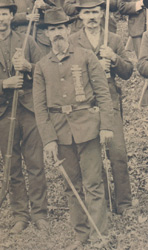 I know this can be disconcerting for those of us who desire to succeed. But God provided for Gideon. He gave him the win. That's right, 300 men defeated 135,000. God is our strength when we have no strength. He pared down Gideon's army, "In order that Israel may not boast against me that her own strength has saved her." Or as the Contemporary English Version of the Bible says, "Gideon, your army is too big. I can't let you win with this many soldiers. The Israelites would think that they had won the battle all by themselves and that I didn't have anything to do with it."
I know this can be disconcerting for those of us who desire to succeed. But God provided for Gideon. He gave him the win. That's right, 300 men defeated 135,000. God is our strength when we have no strength. He pared down Gideon's army, "In order that Israel may not boast against me that her own strength has saved her." Or as the Contemporary English Version of the Bible says, "Gideon, your army is too big. I can't let you win with this many soldiers. The Israelites would think that they had won the battle all by themselves and that I didn't have anything to do with it."
God shrank the army so that the Israelites would know that it was God who gave them the victory not their own strength. Let me think where have I heard something like that before…hmm…
Ephesians 2:8-9 tells us, "For it is by grace you have been saved, through faith… and this not from yourselves, it is the gift of God… not by works, so that no one can boast." What about Corinthians 12:9 when God tells Paul, "My grace is sufficient for you, for my power is made perfect in weakness." How does Paul respond? He says, "Therefore I will boast all the more gladly about my weaknesses, so that Christ's power may rest on me."
 This is one of the great dichotomies of our faith. In our weakness God is strong. God wants His glory to be shown through your life, but the only way He can do it is for you to give up your strength to Him. Our responsibility as Christians is really to give up more and more of our lives to the Lord so that He can use us to the fullest extent.
This is one of the great dichotomies of our faith. In our weakness God is strong. God wants His glory to be shown through your life, but the only way He can do it is for you to give up your strength to Him. Our responsibility as Christians is really to give up more and more of our lives to the Lord so that He can use us to the fullest extent.
I wrote something that I found to be profound. When I wrote it I was intending to be a pain in the butt, but (heh...buttbut) I thought about it some. I have now decided that it was a profound and astoundingly theological statement. I was disseminating my enduring wisdom in my passing ignorance (think on that paradox for minute...not too long, it might hurt).
"Even when everyone else thinks I lose, I win."
 I know it sounds kind of arrogant at first, but if you think about it in the context of wanting to be a disciple of Christ then it takes on a whole new meaning. Look at the paradox we are given by Christ in Mark 8:35-36, "For whoever wants to save his life will lose it, but whoever loses his life for me and for the gospel will save it. What good is it for a man to gain the whole world, yet forfeit his soul?"
I know it sounds kind of arrogant at first, but if you think about it in the context of wanting to be a disciple of Christ then it takes on a whole new meaning. Look at the paradox we are given by Christ in Mark 8:35-36, "For whoever wants to save his life will lose it, but whoever loses his life for me and for the gospel will save it. What good is it for a man to gain the whole world, yet forfeit his soul?"
To lose means to gain? Wait a sec....that doesn't sound right. But it is true. We are set free by what we give up. Now we humans have this nasty habit that we put ourselves in situations that we either win or lose because we feel that in order win someone else has to lose. But have you ever let yourself lose in order to win? I have a great example:
 When Chrissy and I were dating she wanted an engagement ring (for some strange reason). I felt that a ring was a stupid thing to buy. I didn't see how spending my hard earned cash on a rock someone picked up off the ground (and then grossly overcharged me for) could possibly mean I love her. In my mind, not giving her a ring it would never mean I loved her any less. As a matter of fact, I thought that if she truly loved me then she wouldn't ask me to spend that kind of money on a chip of glass to prove to her that I loved her.
When Chrissy and I were dating she wanted an engagement ring (for some strange reason). I felt that a ring was a stupid thing to buy. I didn't see how spending my hard earned cash on a rock someone picked up off the ground (and then grossly overcharged me for) could possibly mean I love her. In my mind, not giving her a ring it would never mean I loved her any less. As a matter of fact, I thought that if she truly loved me then she wouldn't ask me to spend that kind of money on a chip of glass to prove to her that I loved her.
We argued about this a long time. I'm stubborn and she's a girl. So that should be a good indicator that we were evenly matched (LOL). I chose eventually to relent and purchased a ring. I lost the fight, but I also won. I did not get my way, but my way put me in danger of losing a very special person. (Though I still think rings are a waste of money)
 In our walk with God we often feel like we are put in a losing situation if we follow what He wants for us, but I'm here to tell you that His will is for the best which is why we win when we lose. It's very hard to let yourself lose because we are selfish, stubborn beings that want what we want right now. God doesn't work that way though. If I had always won I would have chosen many things differently in my life, but I know now that God needs us to be able to lose if He is going to win, and He is a gracious winner who will reward us immeasurably more for losing than we ever could earn by winning.
In our walk with God we often feel like we are put in a losing situation if we follow what He wants for us, but I'm here to tell you that His will is for the best which is why we win when we lose. It's very hard to let yourself lose because we are selfish, stubborn beings that want what we want right now. God doesn't work that way though. If I had always won I would have chosen many things differently in my life, but I know now that God needs us to be able to lose if He is going to win, and He is a gracious winner who will reward us immeasurably more for losing than we ever could earn by winning.
Matthew 8:23-27 (NIV)
Then he got into the boat and his disciples followed him. Without warning, a furious storm came up on the lake, so that the waves swept over the boat. But Jesus was sleeping. The disciples went and woke him, saying, "Lord, save us! We're going to drown!"
He replied, "You of little faith, why are you so afraid?" Then he got up and rebuked the winds and the waves, and it was completely calm.
The men were amazed and asked, "What kind of man is this? Even the winds and the waves obey him!"
 There is so much about this story that is fascinating. First off I think that it's important to note that this was not a small storm that was exaggerated. A good portion of the disciples that followed Jesus were fishermen. They knew the difference between a passing rain shower and a storm that was going to sink their boat. This must have been a whopper if they were afraid that they were going to sink and die.
There is so much about this story that is fascinating. First off I think that it's important to note that this was not a small storm that was exaggerated. A good portion of the disciples that followed Jesus were fishermen. They knew the difference between a passing rain shower and a storm that was going to sink their boat. This must have been a whopper if they were afraid that they were going to sink and die.
Nextly, Jesus is sleeping. Dude must have been exhausted. Sunday night we had some wicked storms. There was one point during the night I woke up because I thought someone had knocked over a bookcase, it was only thunder. Okay, if we put these pieces together. This is a wicked awesome storm, Jesus is sleeping, and then we add in the fact that the disciples woke Him up…
Why did they wake Him up? They were amazed when He calmed the water. That certainly was not what they had expected. What purpose did waking Jesus up serve? This is early in Jesus' ministry, sure He's healed some people, but He doesn't even have all 12 apostles yet. He won't meet Matthew until the next chapter. The only thing I can figure is that the disciples were upset that they were going to die and Jesus seemed perfectly content to sleep through the whole thing.
 Now if Jesus was asleep, He obviously was not worried by the storm. If you think you are going to die, you tend to have a hard time sleeping. So the disciples wake Him up and He looks at them and says, "You of little faith, why are you so afraid?" Then He rebukes the wind and waves and everything goes completely calm. Then I picture Him laying back down and going back to sleep (though it doesn't say that He did, but why wouldn't He?). Terrible storm, wakes up, calms storm, goes back to sleep. Like you would hit snooze on your alarm clock.
Now if Jesus was asleep, He obviously was not worried by the storm. If you think you are going to die, you tend to have a hard time sleeping. So the disciples wake Him up and He looks at them and says, "You of little faith, why are you so afraid?" Then He rebukes the wind and waves and everything goes completely calm. Then I picture Him laying back down and going back to sleep (though it doesn't say that He did, but why wouldn't He?). Terrible storm, wakes up, calms storm, goes back to sleep. Like you would hit snooze on your alarm clock.
Okay, where are you going with this Nathan?
Quite simply put I am trying to point out that sometimes our strongest storms in life are nothing more than an opportunity for us to trust God. He knows what we are going through. He didn't forget. We didn't get overlooked. It's simply that we need to trust that God is going to get us through. Part of life is weathering the storms that try to knock us out of God's hand, our only hope is to hold that much tighter and trust that He loves us.
Phillipians 1:12-18 (NIV)
Now I want you to know, brothers, that what has happened to me has really served to advance the gospel. As a result, it has become clear throughout the whole palace guard and to everyone else that I am in chains for Christ. Because of my chains, most of the brothers in the Lord have been encouraged to speak the word of God more courageously and fearlessly.
It is true that some preach Christ out of envy and rivalry, but others out of goodwill. The latter do so in love, knowing that I am put here for the defense of the gospel. The former preach Christ out of selfish ambition, not sincerely, supposing that they can stir up trouble for me while I am in chains. But what does it matter? The important thing is that in every way, whether from false motives or true, Christ is preached. And because of this I rejoice.
If it has not happened to you by now, I'm sorry to say it will happen in the future. There will be Christians who you will meet who advance the Gospel, not for the sake of Christ but for their own personal glory. There are even those who will do it to spite you or others. I know it sounds silly, but it is true. I have met them, I'm afraid at one time or another I have been one of them. There is any number of people who have spread the gospel in order to be able to say "Our church/youth group has X amount of members."
It may be comforting to know that Paul was even dealing with this back during his ministry. But his unusual response here is what really draws attention. He says, "HOORAY!" Umm, excuse me Paul, I hate to break this to you, but people are not preaching in an effort to spread the good news of Christ, but are doing it for selfish reasons. Paul this is a bad thing, right?

But what Paul tells us is that, he doesn't care why people are preaching the Truth, as long as they preach the Truth. He of course points out that it is far better that people evangelize for the right reasons, but even if they aren't God can use them. This can be frustrating for us; at least it is for me. If someone is doing something for the wrong reason and I feel I'm doing it for the right reason, I tend to want them to fail and for my efforts to be rewarded. Suddenly my mind has taken a dangerous turn, I've just become one of those people who is doing it for the wrong reason… Holy Carp!! How did that happen?

This is what Paul is getting at. Our ego is such a dangerous thing. It can turn us against God and others so quickly that we don't even see it coming. During the 80's there was any number of "televangelists" (if you don't know what that is, ask your parents). A number of these televangelists had a HUGE impact on the hearts and minds of people. They made some solid contributions to Christ. There were a number of them who had a terrible falling out be it adultery, embezzlement, or pride and suddenly they were no longer respected. Does this mean that the people who they touched with the good news are no longer Christians? Absolutely not.
Paul is telling us that as long as Christ is preached, let God sort out who is and who is not sincere. Like that old saying "Kill em all and let God sort em out." We are to wish the best for those who may not be pursuing others for the right reasons. In the end we are all brothers and sisters in Christ and while we may not always get along with our siblings, we need to support each other.
Matthew 13:44-50 (NIV)

 "The kingdom of heaven is like treasure hidden in a field. When a man found it, he hid it again, and then in his joy went and sold all he had and bought that field.
"The kingdom of heaven is like treasure hidden in a field. When a man found it, he hid it again, and then in his joy went and sold all he had and bought that field.

 "Again, the kingdom of heaven is like a merchant looking for fine pearls. When he found one of great value, he went away and sold everything he had and bought it.
"Again, the kingdom of heaven is like a merchant looking for fine pearls. When he found one of great value, he went away and sold everything he had and bought it.

 "Once again, the kingdom of heaven is like a net that was let down into the lake and caught all kinds of fish. When it was full, the fishermen pulled it up on the shore. Then they sat down and collected the good fish in baskets, but threw the bad away. This is how it will be at the end of the age. The angels will come and separate the wicked from the righteous and throw them into the fiery furnace, where there will be weeping and gnashing of teeth."
"Once again, the kingdom of heaven is like a net that was let down into the lake and caught all kinds of fish. When it was full, the fishermen pulled it up on the shore. Then they sat down and collected the good fish in baskets, but threw the bad away. This is how it will be at the end of the age. The angels will come and separate the wicked from the righteous and throw them into the fiery furnace, where there will be weeping and gnashing of teeth."
At first it may seem that parable A and B have little to do with parable C. Okay, we have two instances of someone giving all they had for a treasure. Then suddenly we have fish…fish?!? Try looking at it from this perspective, the first two have to do with the present, the last has to do with the future. So why are they grouped together here? I have a theory (I know you're shocked).
It seems that Jesus is giving us the heads up regarding what it will cost to truly get into Heaven. The final parable here is explaining the separating of the "men from the boys" if you pardon the expression. It is the difference between a passing interest in Christ and wholly selling out for Him. Maybe what we are being told is that there will be a lot of people who will claim to be Christ followers, some will go to church, and some will hold positions of importance within the Kingdom but they have not sold out to Jesus. What if the first two parables are the benchmark for what it takes to be a "good fish" in the final parable?
This has startling implications in our lives. If we are being told that A and B are what it takes to survive C (which is supported by the context) then we have to give significant consideration to how we live our lives in regard to the first and second parable (A and B respectively). Have you given up everything for the truth of the Gospel?
You may think you have much to lose now, but its not going to get any easier. I think it was best said by an early Christian music artist, Keith Green, in his song "Pledge My Head to Heaven":
Well, I pledge my head to heaven for the Gospel,
And I ask no man on Earth to fill my needs.
Like the sparrow up above, I am enveloped in His love,
And I trust Him like those little ones, He feeds.
Well I pledge my wife to heaven, for the Gospel,
Though our love each passing day just seems to grow.
As I told her when we wed, I'd surely rather be found dead,
Than to love her more than the one who saved my soul.
I'm your child, and I want to be in your family forever.
I'm your child, and I'm going to follow you,
No matter whatever the cost, I'm gonna count all things lost.
Well I pledge my son to heaven for the gospel.
Though he's kicked and beaten, ridiculed and scorn.
I will teach him to rejoice, and lift a thankful praising voice,
And to be like Him who bore the nails and crown of thorns.
I'm your child, and I want to be in your family forever.
I'm your child, and I'm going to follow you,
No matter whatever the cost, I'm gonna count all things lost.
Oh no matter whatever the cost, I'm gonna count all things lost.
Well I've had the chance to gain the world, and to live just like a king,
But without your love, it doesn't mean a thing.
Oh no matter whatever the cost, I'm gonna count all things lost,
Oh no matter whatever the cost, I'm gonna count all things lost.
Well I pledge my son, I pledge my wife, I pledge my head to heaven,
I pledge my son, I pledge my wife, I pledge my head to heaven, for the gospel.
Psalms 73:25-28 (NIV)
Whom have I in heaven but you?
And earth has nothing I desire besides you.
My flesh and my heart may fail,
but God is the strength of my heart
and my portion forever.
Those who are far from you will perish;
you destroy all who are unfaithful to you.
But as for me, it is good to be near God.
I have made the Sovereign LORD my refuge;
I will tell of all your deeds.
More important than all the things you could buy. More important than all the hopes you could have. More important than all the experiences that you could experience is peace. Peace is what we all strive for. What we hope to find. I don't speak of peace as the absence of conflict. True peace is more than that. True peace finds comfort in what is, what was, and what will be.
 We cannot control what others do, nor can we change their hearts. That is for God alone. But we can find peace, inner contentment. This kind of peace comes from understanding that the world will be the world and God will be God no matter how much we disagree or would like things to be different.
We cannot control what others do, nor can we change their hearts. That is for God alone. But we can find peace, inner contentment. This kind of peace comes from understanding that the world will be the world and God will be God no matter how much we disagree or would like things to be different.
We must come to the point in our lives that we realize that stuff is worthless.
Let me say that again:
We must come to the point in our lives that we realize that stuff is worthless.
 No matter how cool it is, or how much you think you need it, it is all just things. As a Switchfoot song says, "All the riches of the kings end up in wills." Imagine the good you could do if you gave up all your stuff, and just became wholly God's child, because we have nothing in heaven or on earth that will match the love of God. Find refuge in Him.
No matter how cool it is, or how much you think you need it, it is all just things. As a Switchfoot song says, "All the riches of the kings end up in wills." Imagine the good you could do if you gave up all your stuff, and just became wholly God's child, because we have nothing in heaven or on earth that will match the love of God. Find refuge in Him.
2 Peter 1:3-11 (The Message)
3-4 Everything that goes into a life of pleasing God has been miraculously given to us by getting to know, personally and intimately, the One who invited us to God. The best invitation we ever received! We were also given absolutely terrific promises to pass on to you—your tickets to participation in the life of God after you turned your back on a world corrupted by lust.
5-9 So don't lose a minute in building on what you've been given, complementing your basic faith with good character, spiritual understanding, alert discipline, passionate patience, reverent wonder, warm friendliness, and generous love, each dimension fitting into and developing the others. With these qualities active and growing in your lives, no grass will grow under your feet, no day will pass without its reward as you mature in your experience of our Master Jesus. Without these qualities you can't see what's right before you, oblivious that your old sinful life has been wiped off the books.
10-11 So, friends, confirm God's invitation to you, his choice of you. Don't put it off; do it now. Do this, and you'll have your life on a firm footing, the streets paved and the way wide open into the eternal kingdom of our Master and Savior, Jesus Christ.
As we grow in our understanding of Christ and the sacrifice He made for us we need to strive to become more like Him in our lives. That's what Peter is trying to get across to us in this passage. He wants us to know that if we want to truly be like Christ we need to grow in areas of our spiritual life. We need to be able to show others (Christian and Non-Christian alike) the calling that has been put in our hearts. But unless we grow in these ways we will not be able to radiate Christ in our lives.
 |
There's what I call the bucket principle. Take an old bucket with wooden slats and you begin to fill it with water. You can only fill it as high as the shortest slat. Because at that shortest slat the water comes pouring out. |
| So if you raise that slat you can fill the bucket with more water. Or in the case of this analogy Christ can fill you more with Himself. And that is the plea we have from Peter, to not allow ourselves to be shortsighted by putting our spiritual formation off, but to make our life goal a closer walk with God. |  |